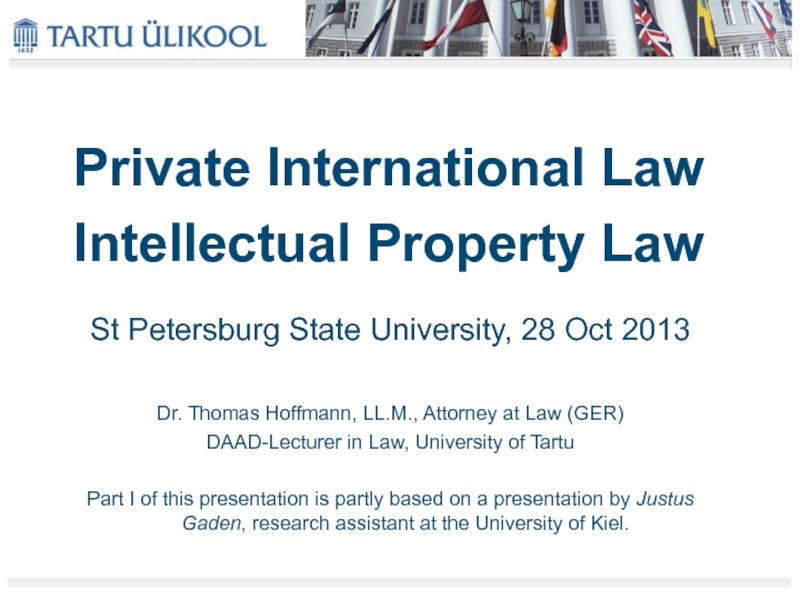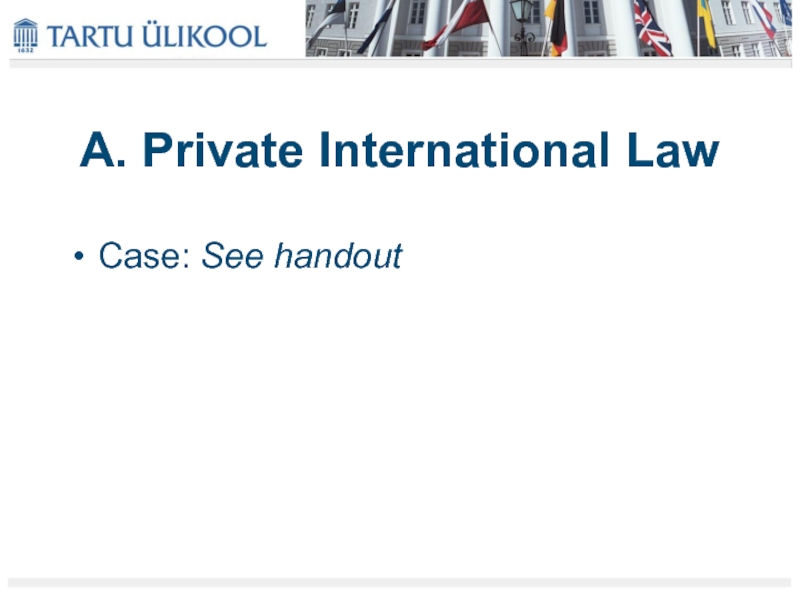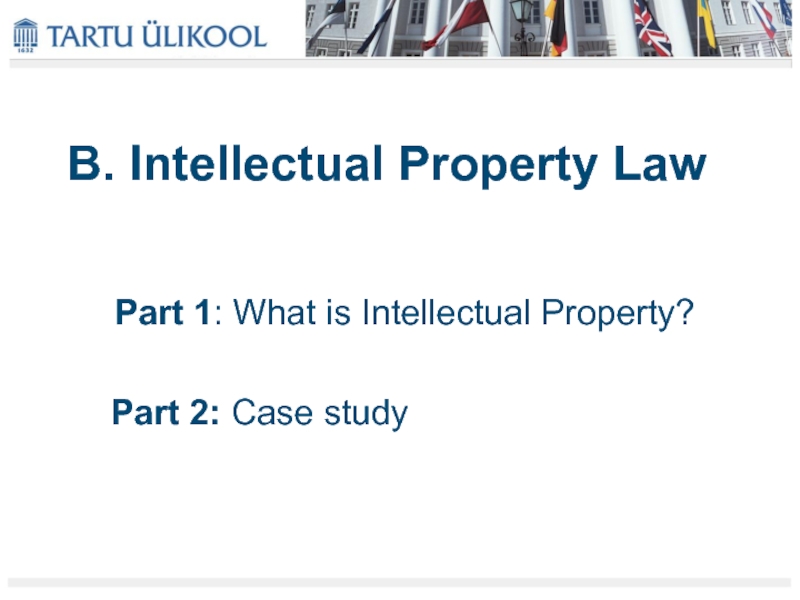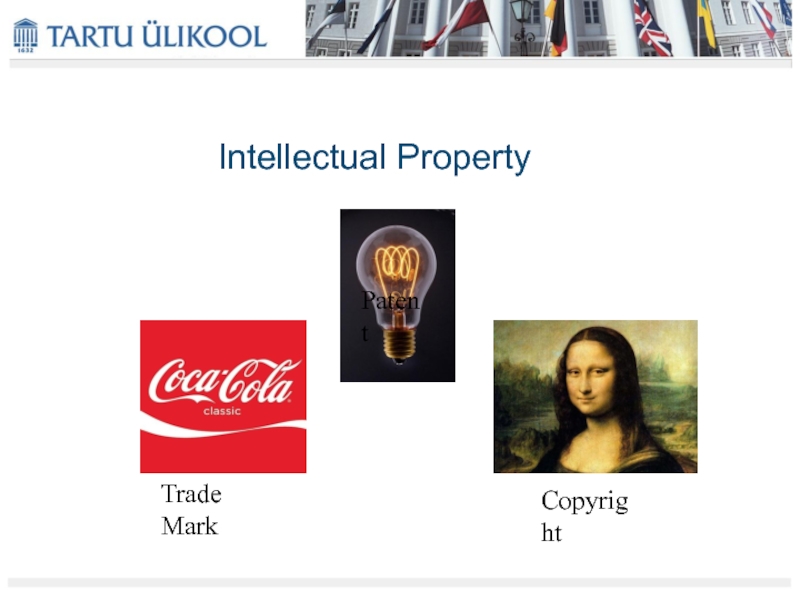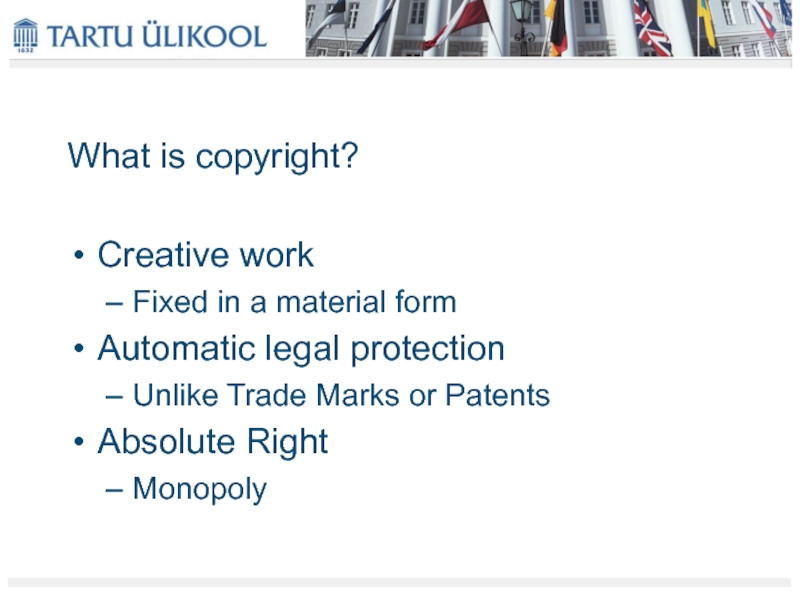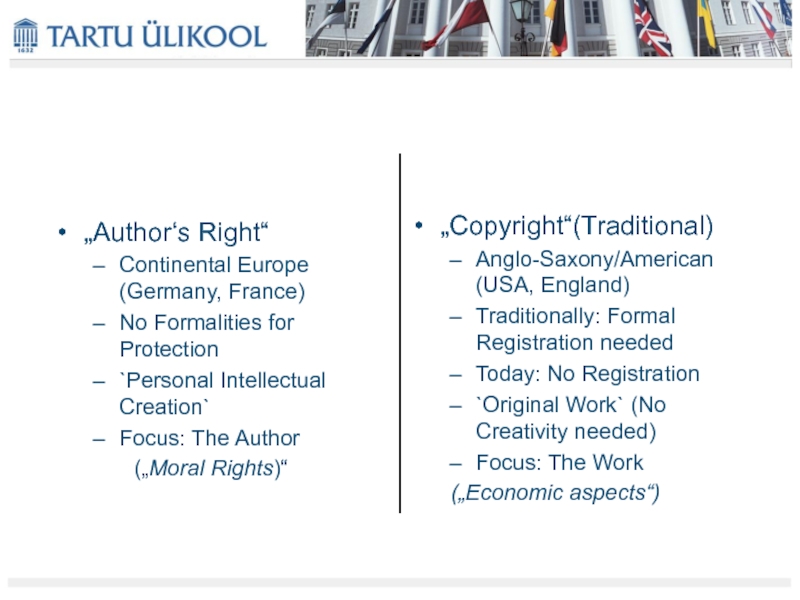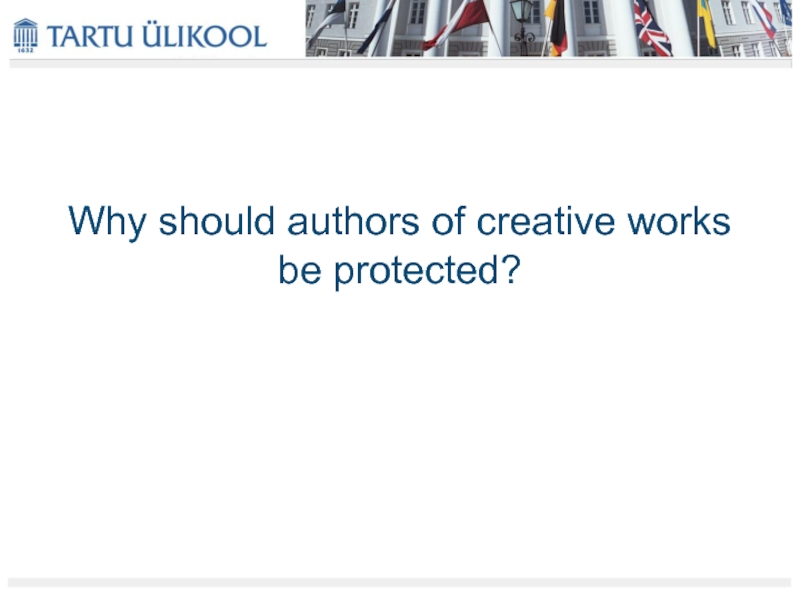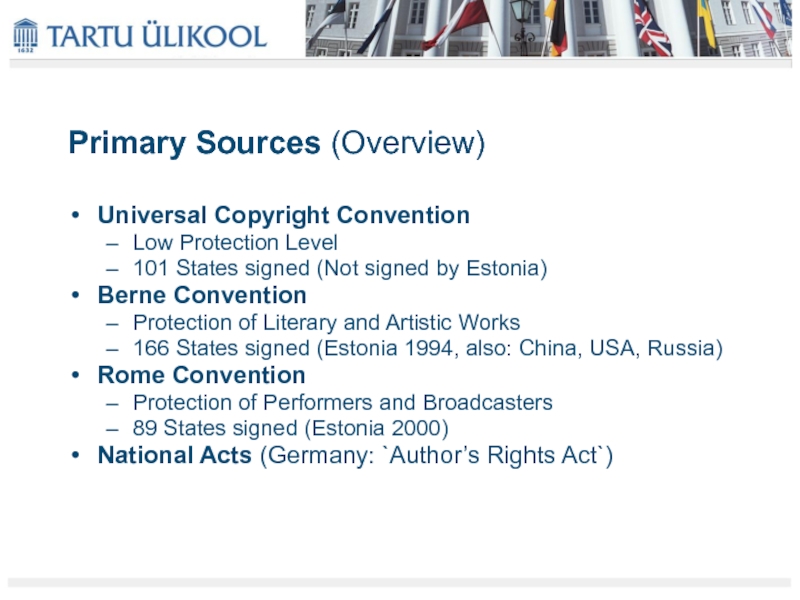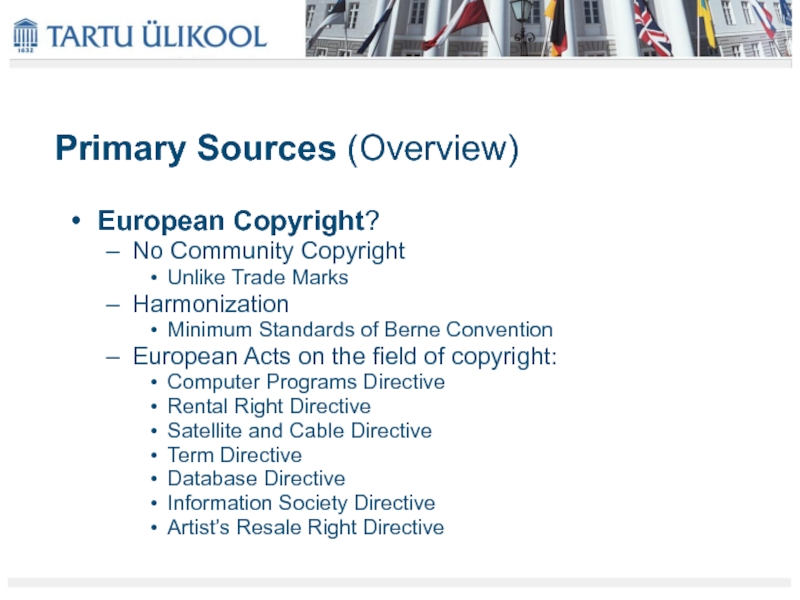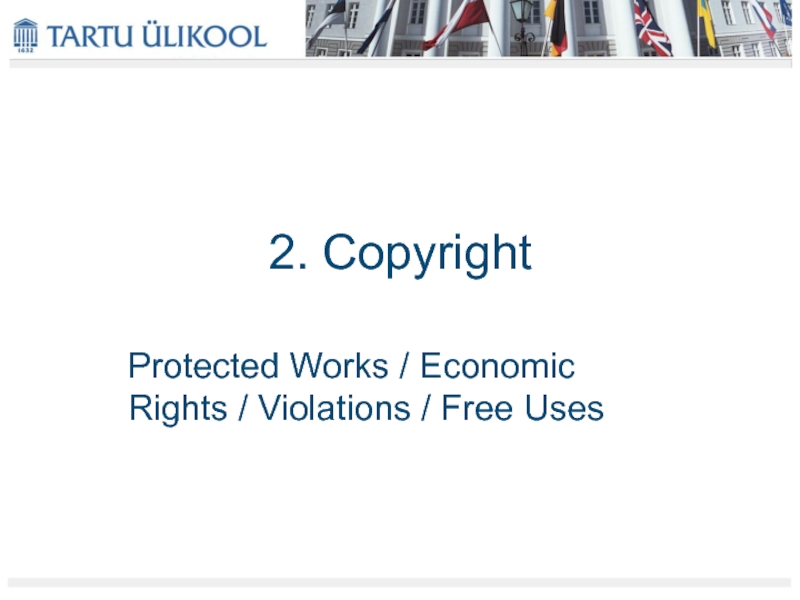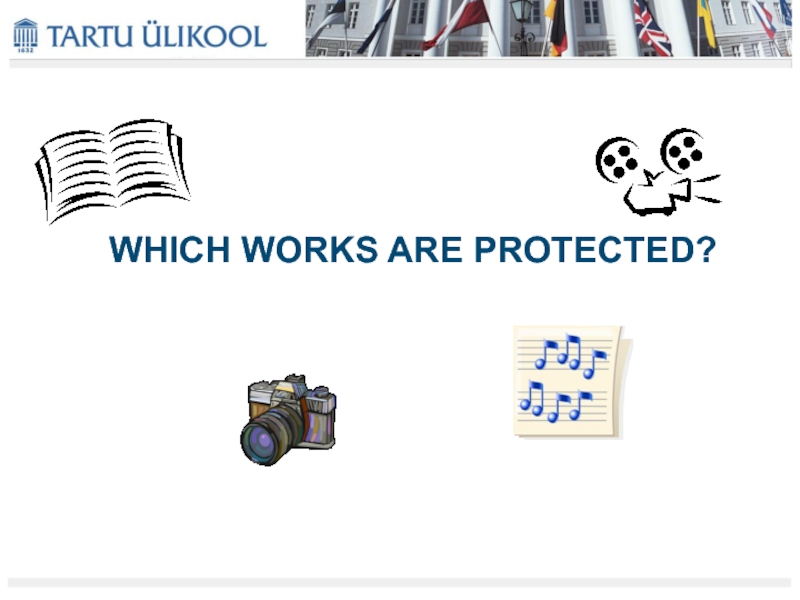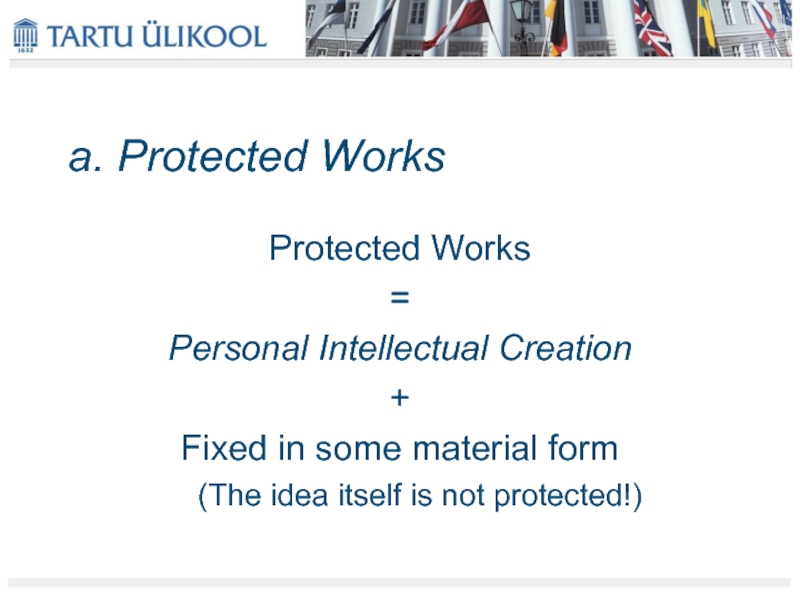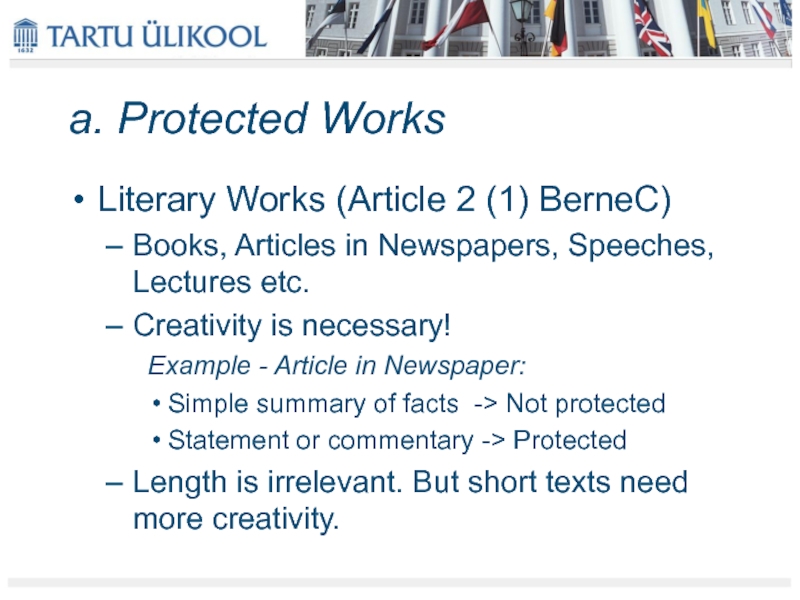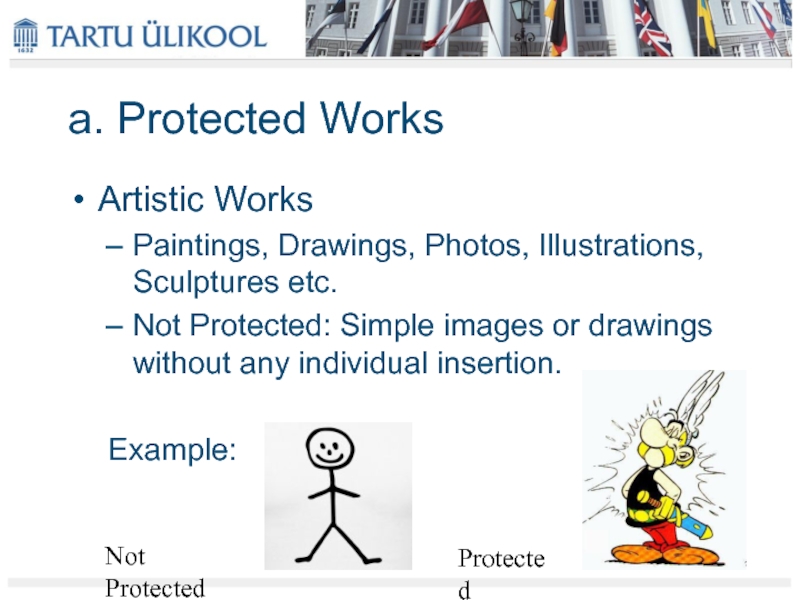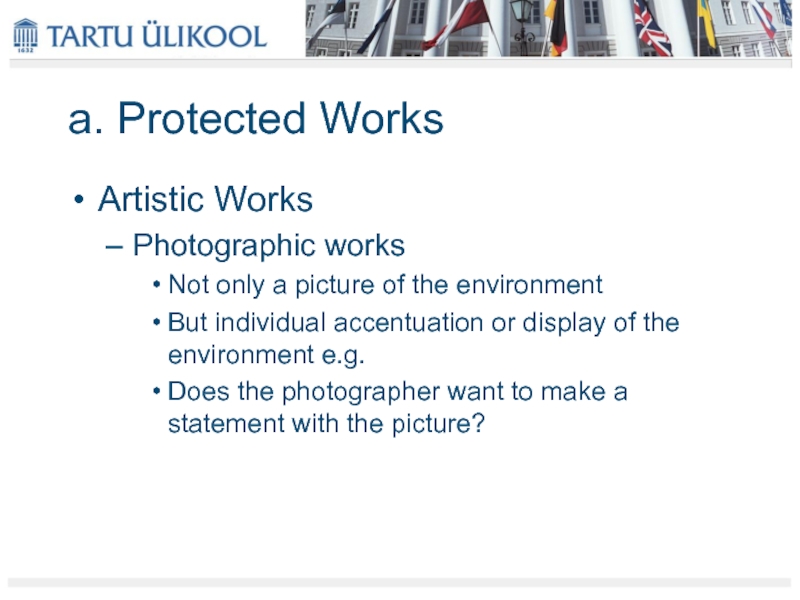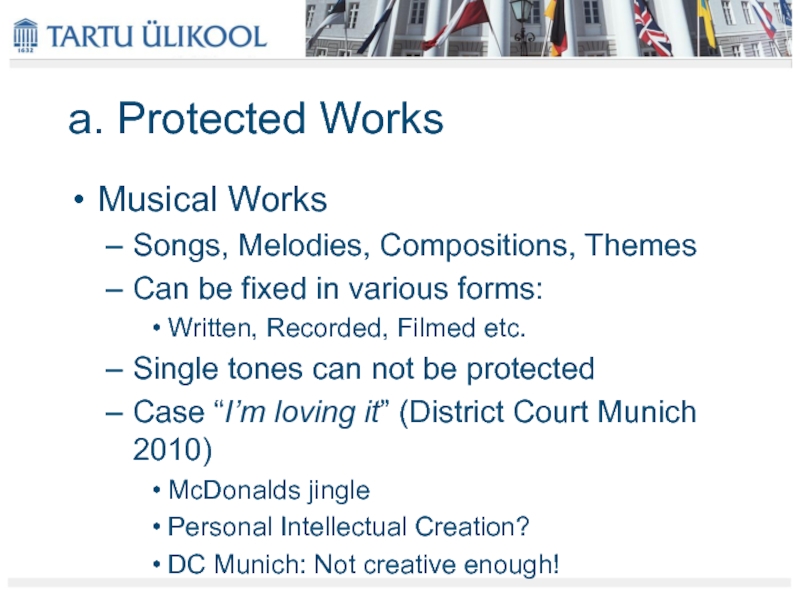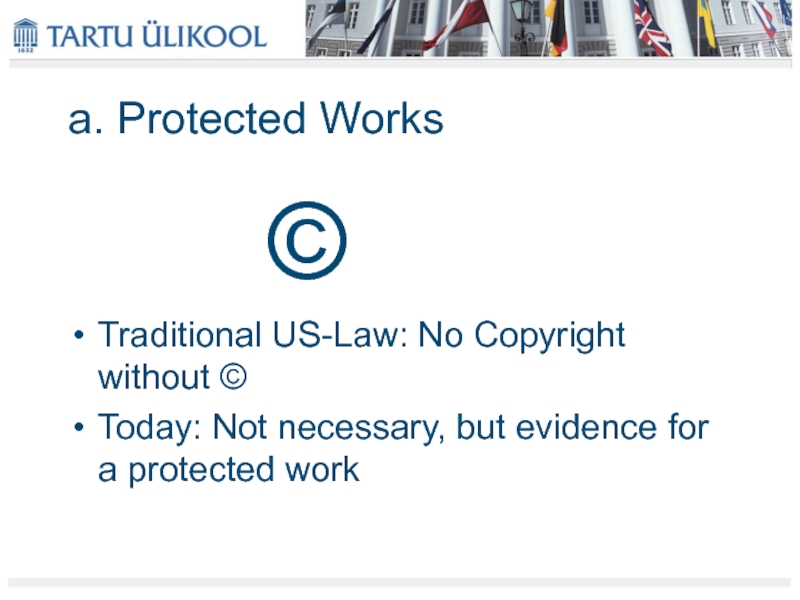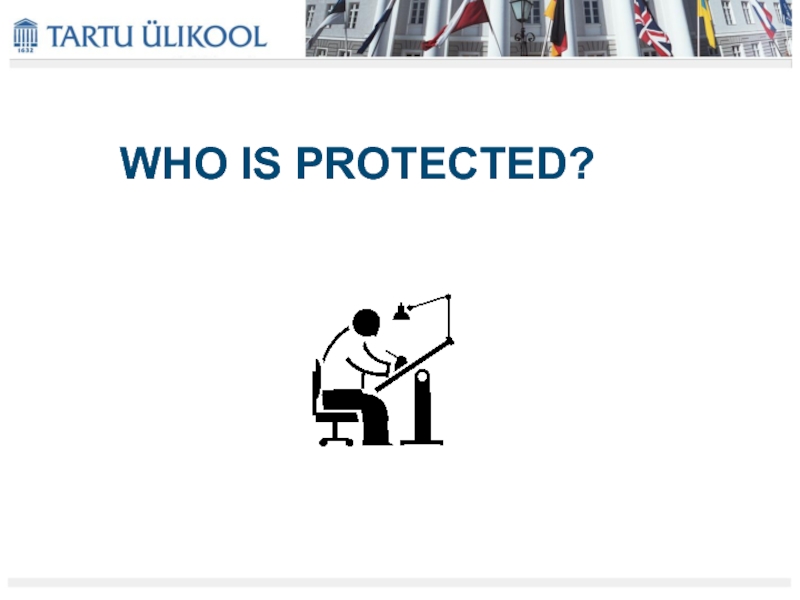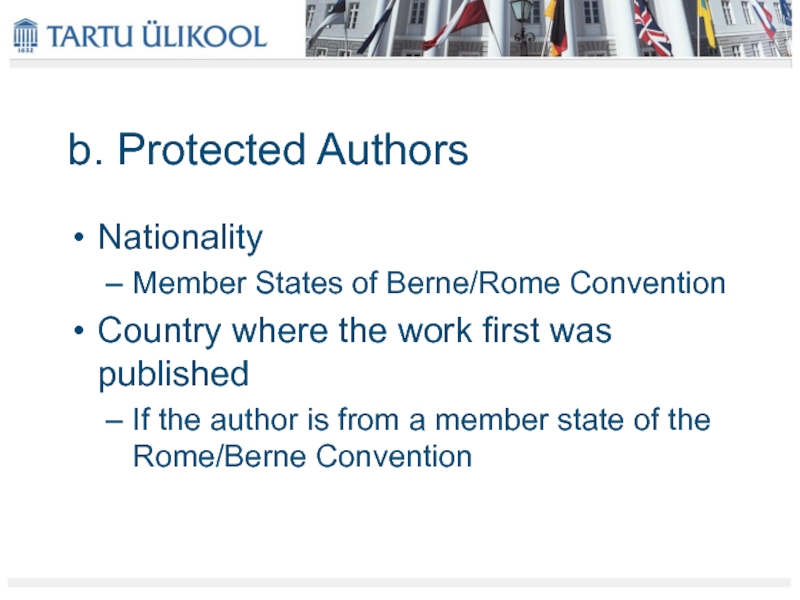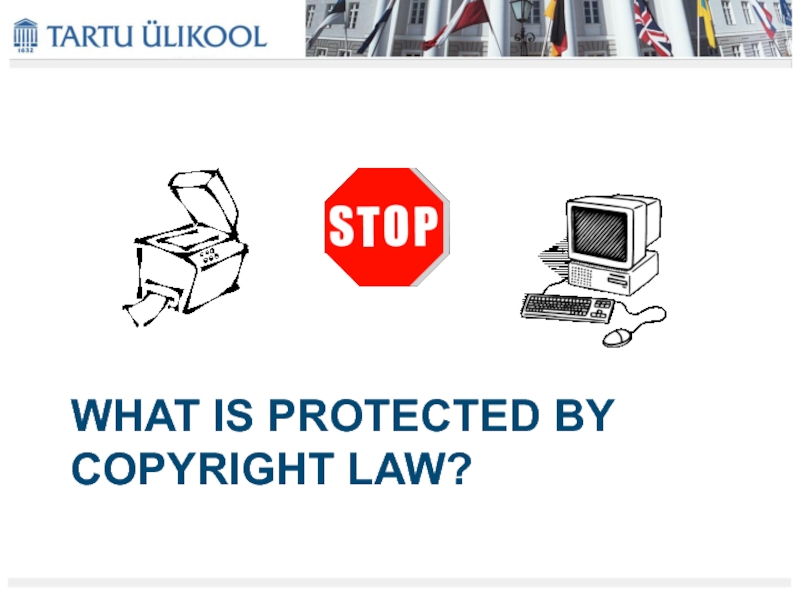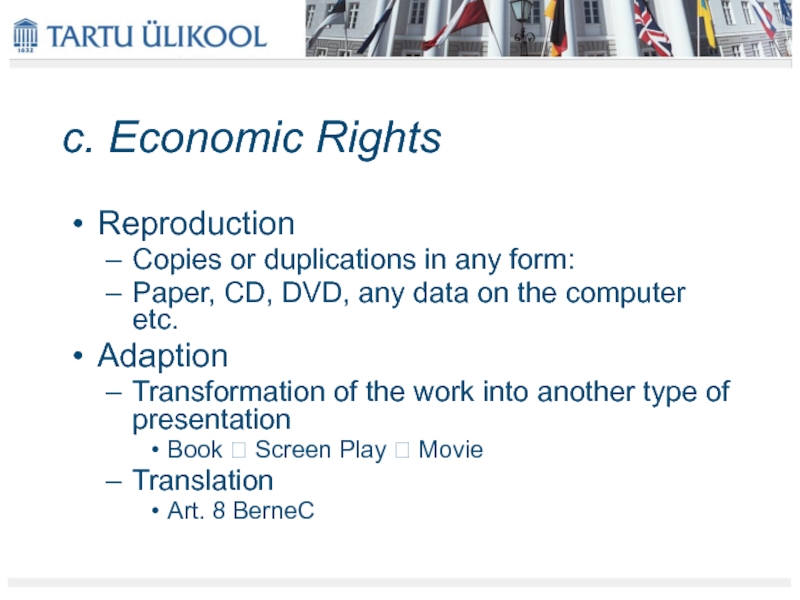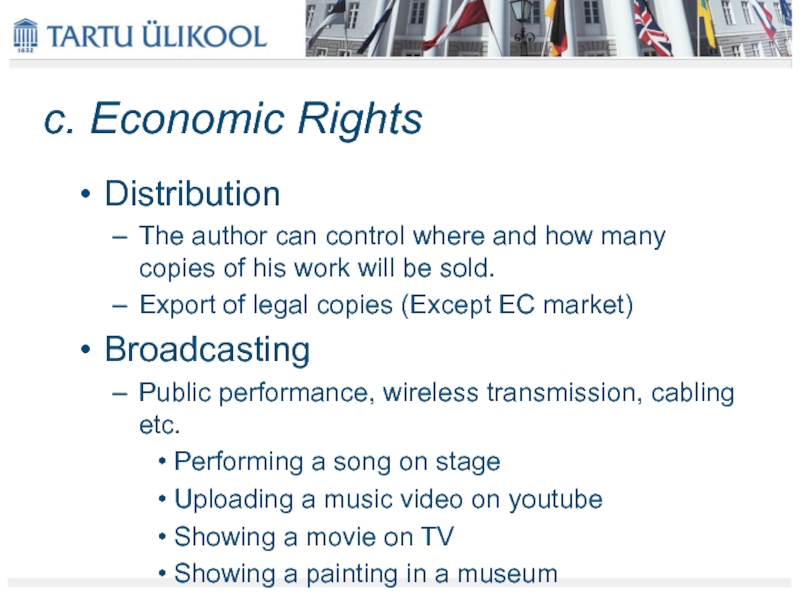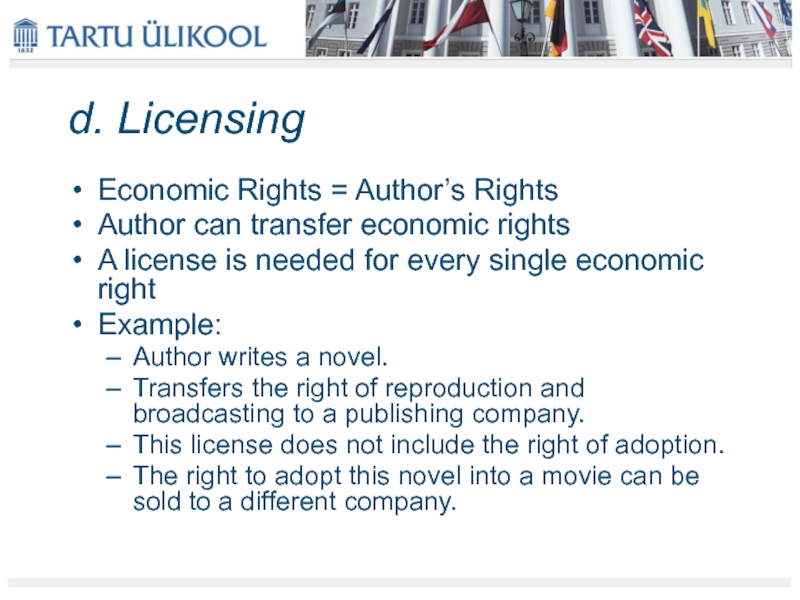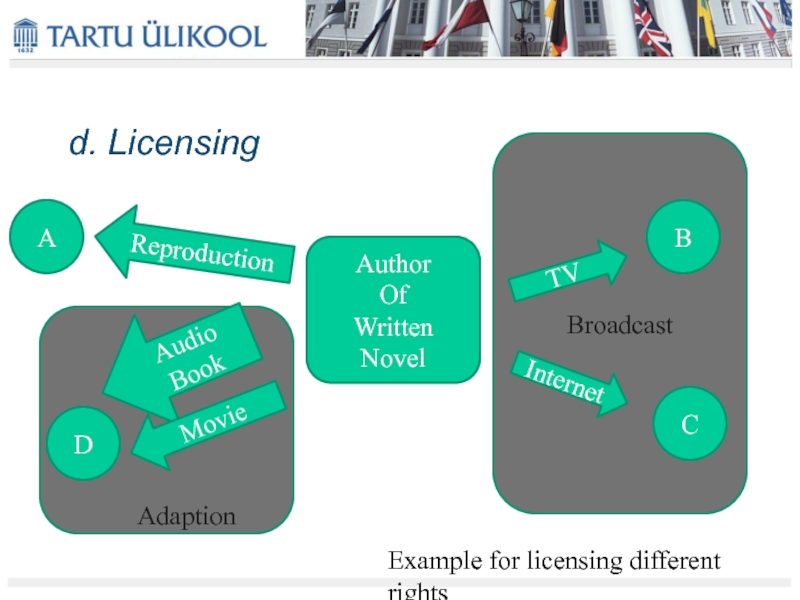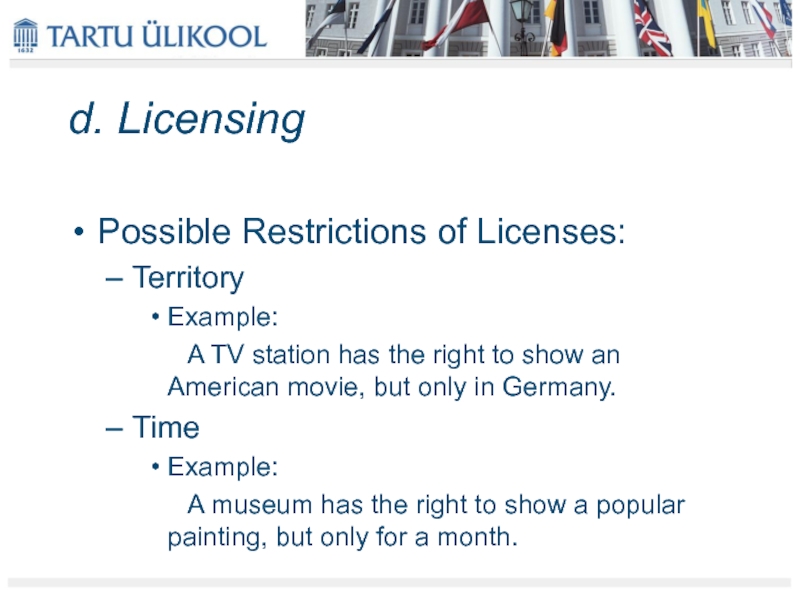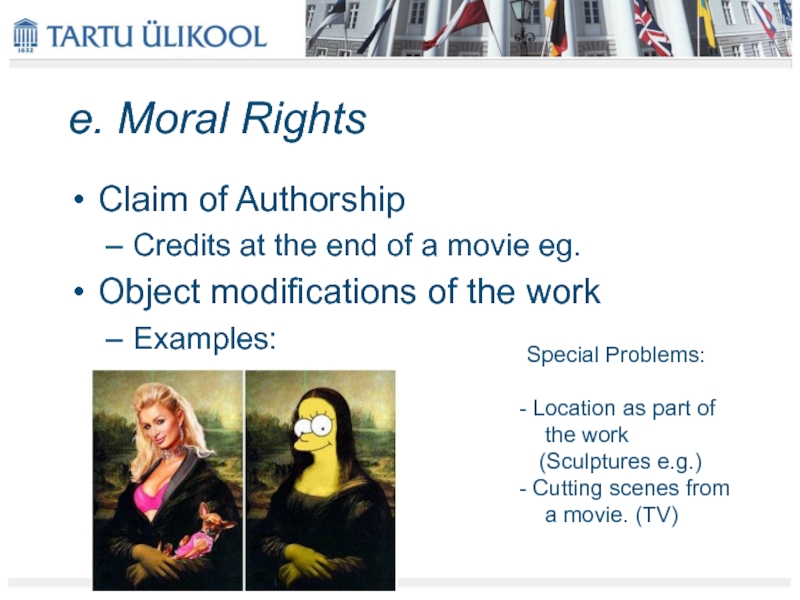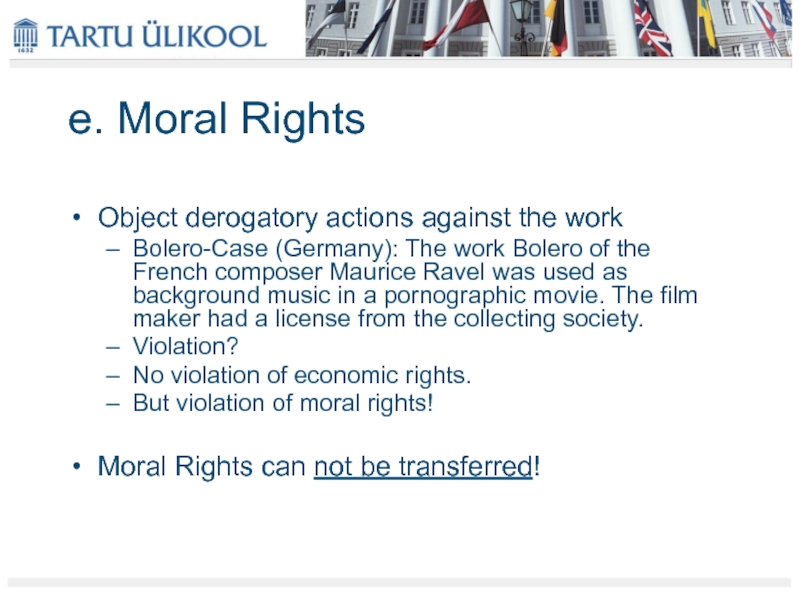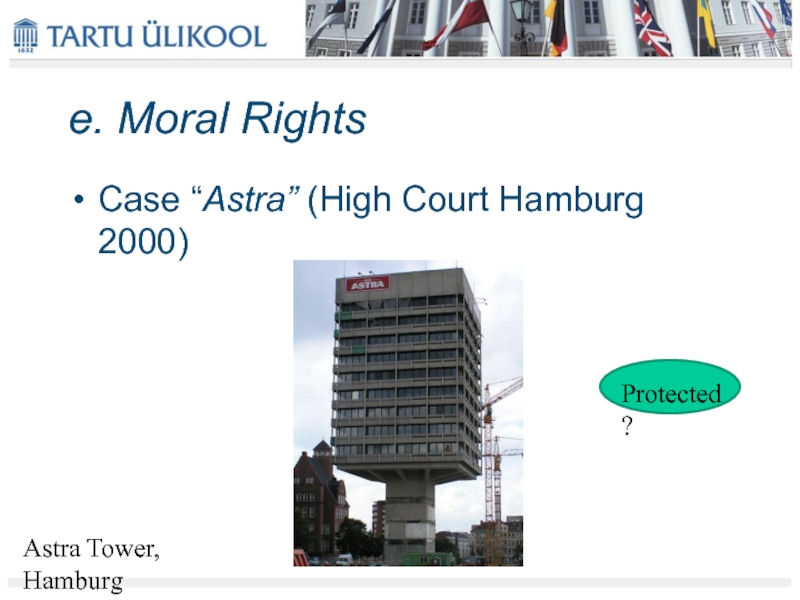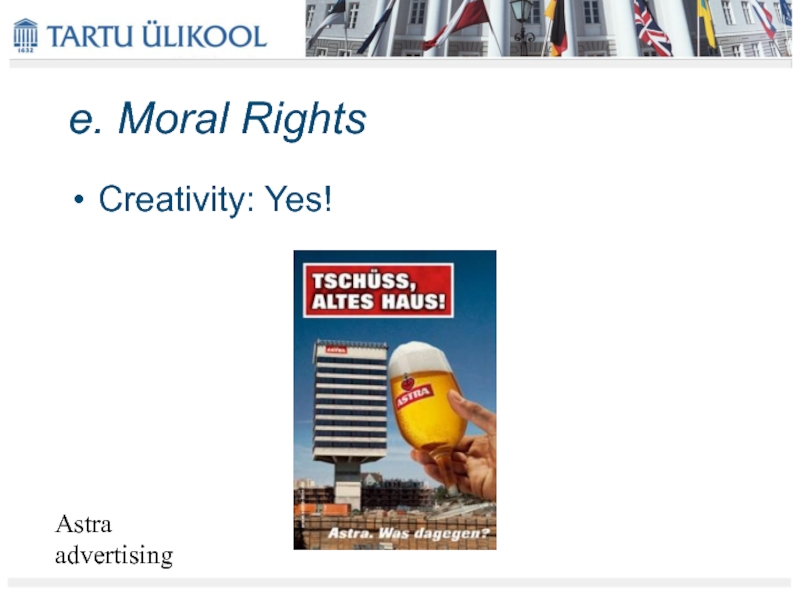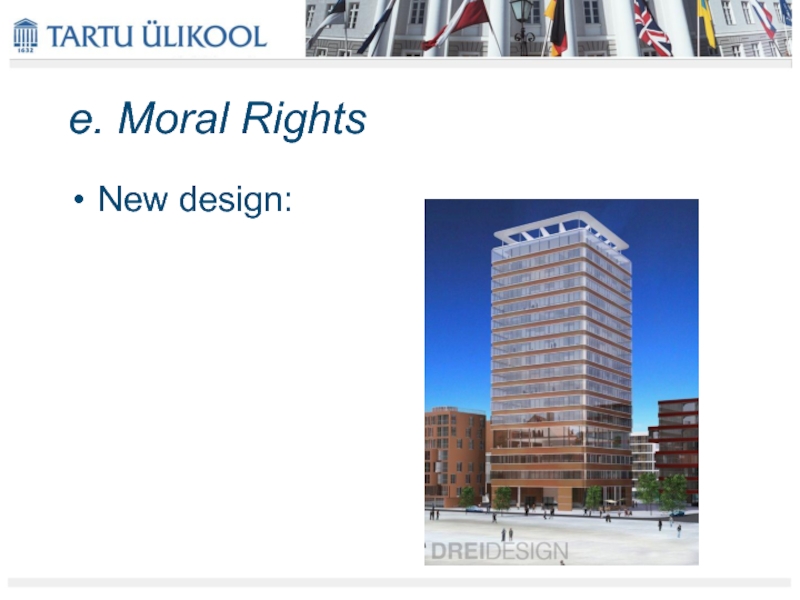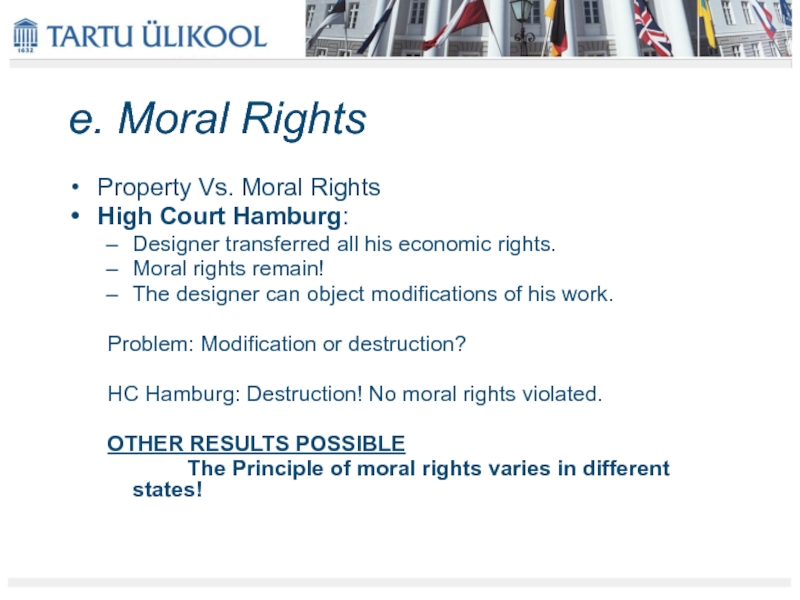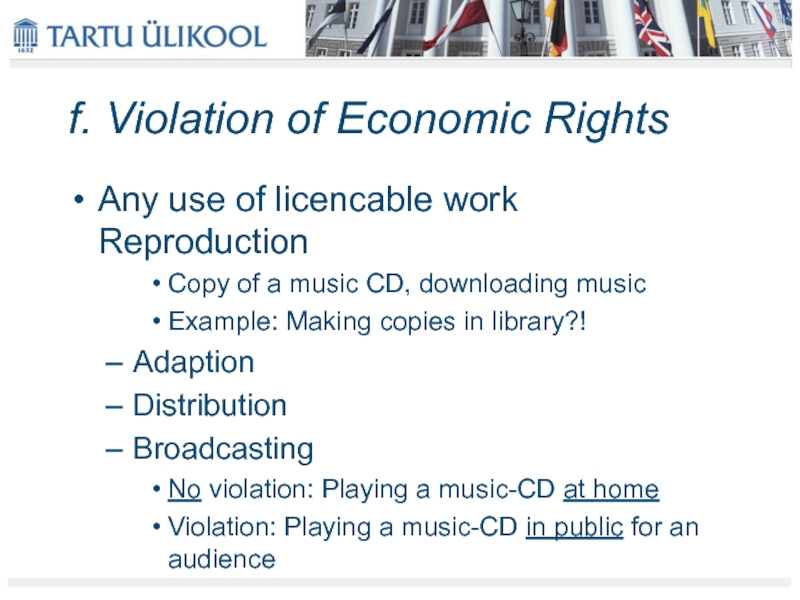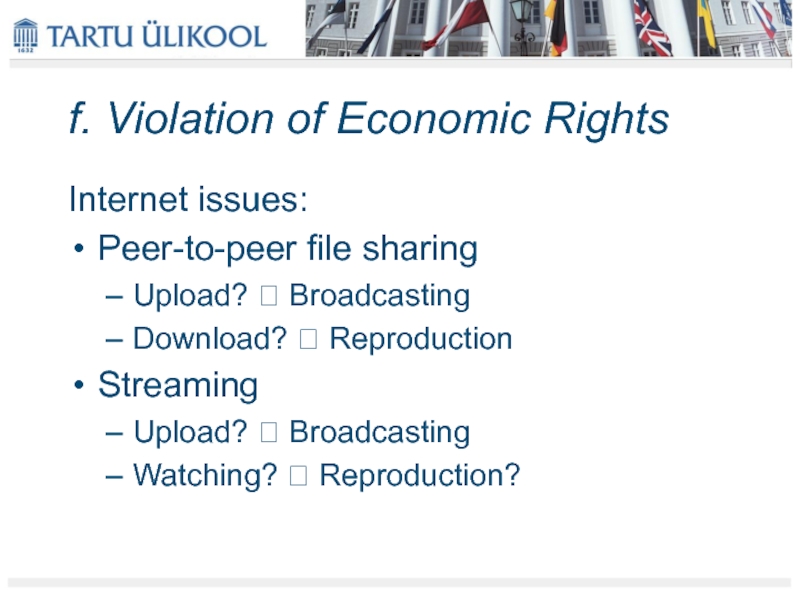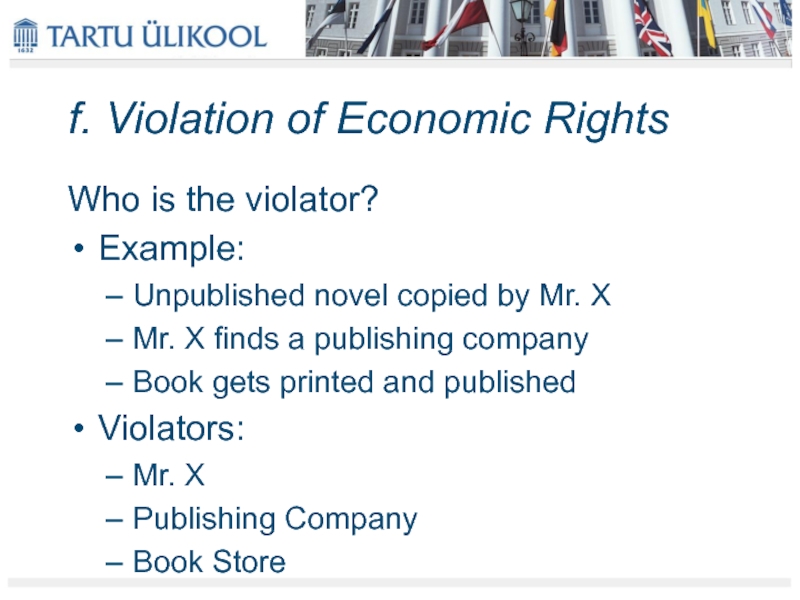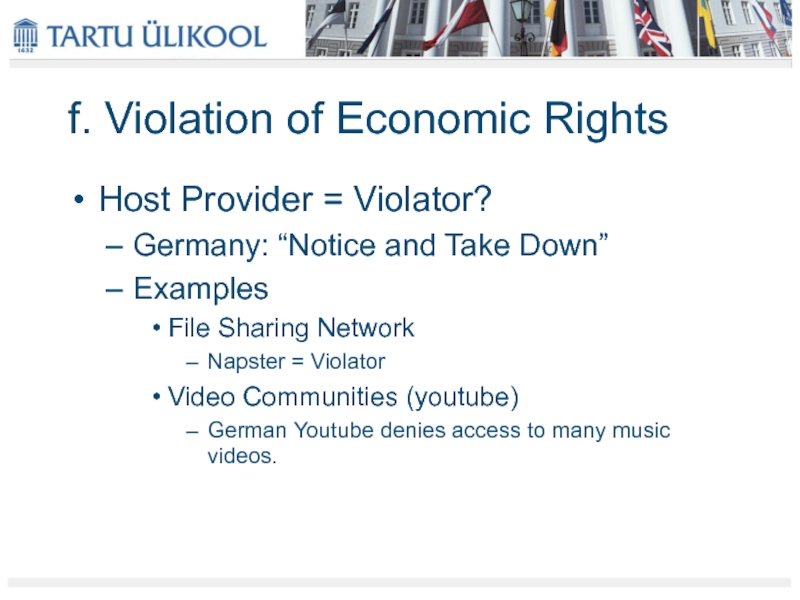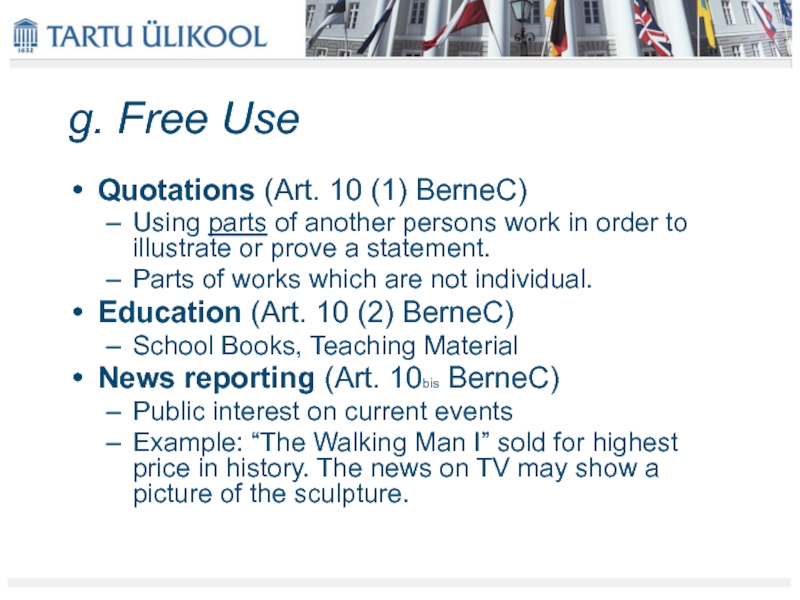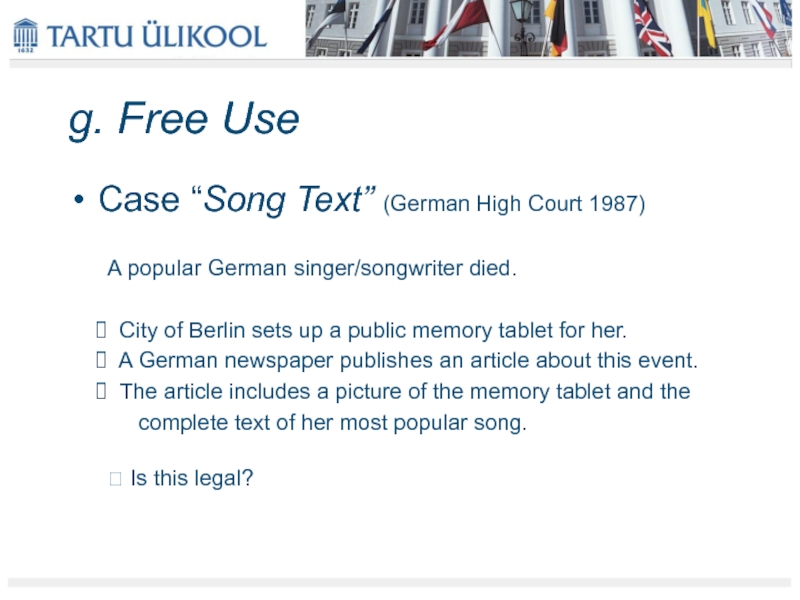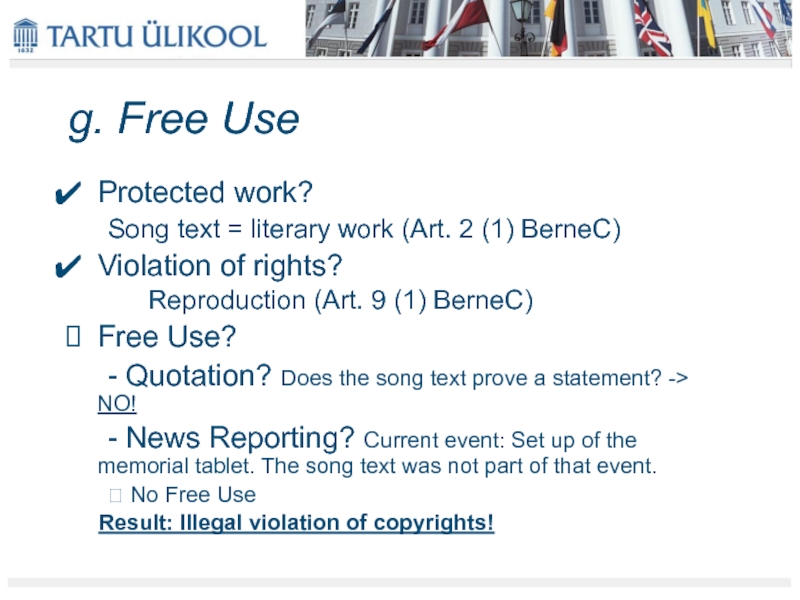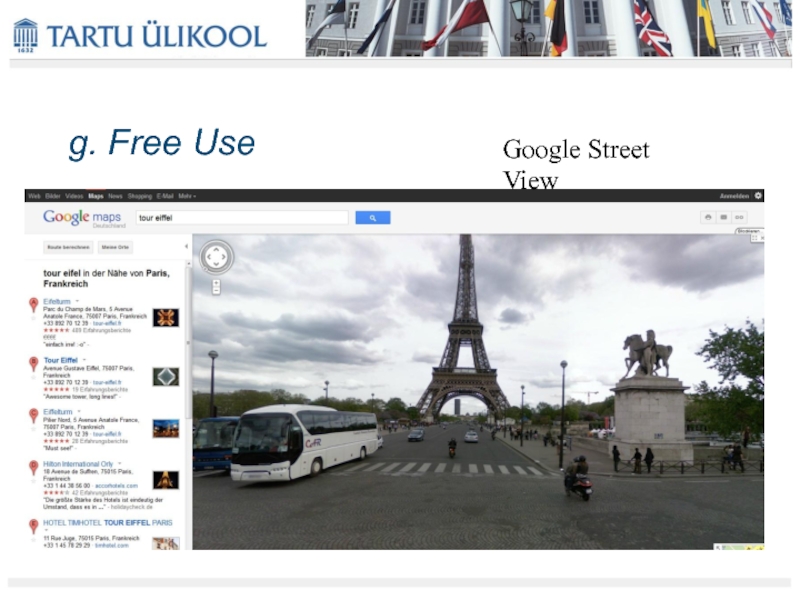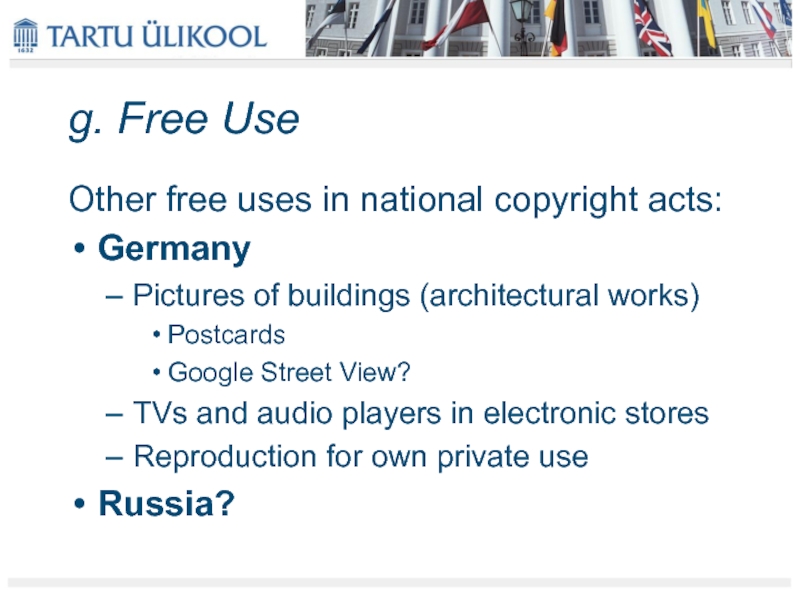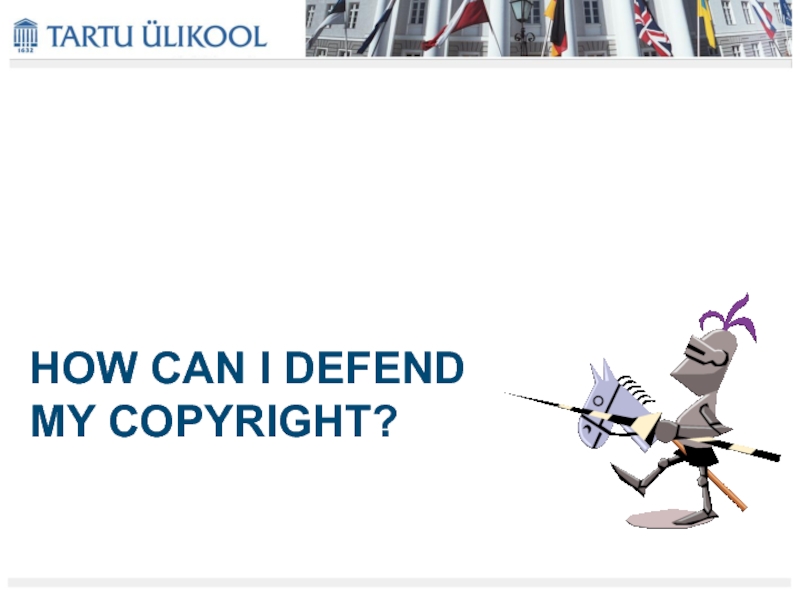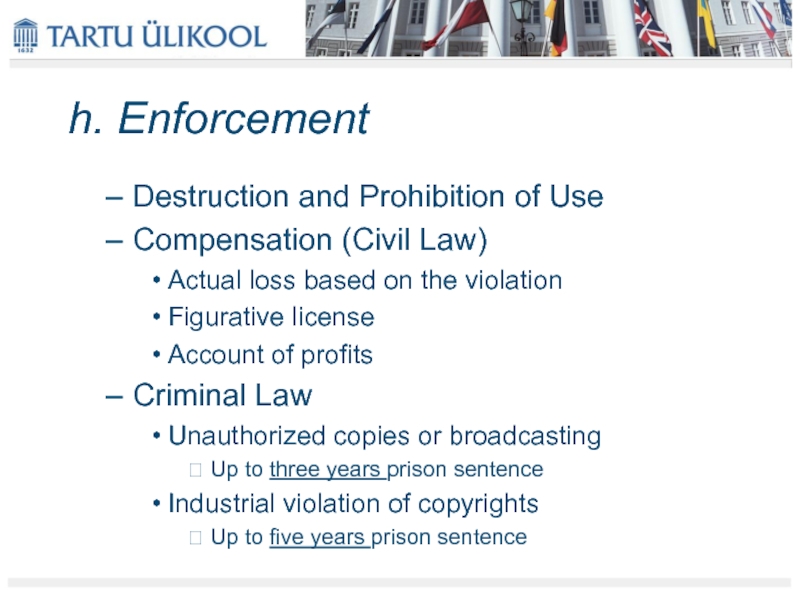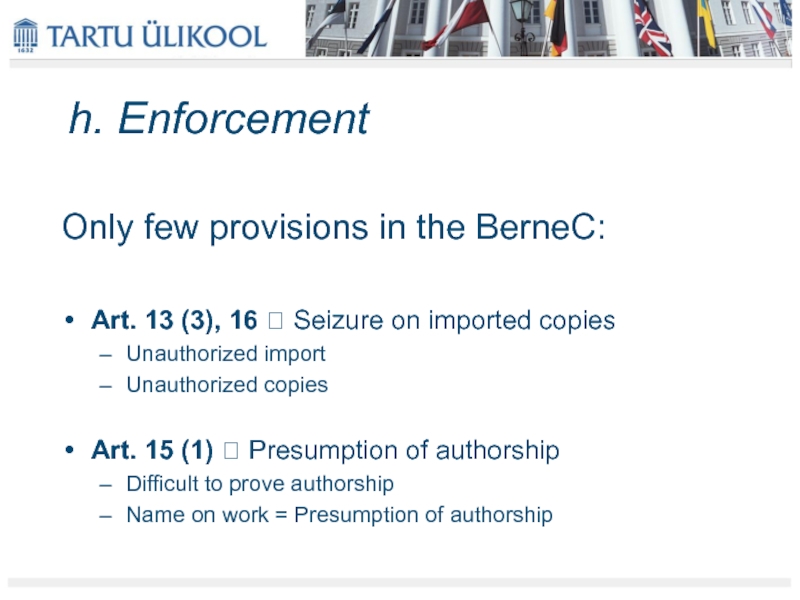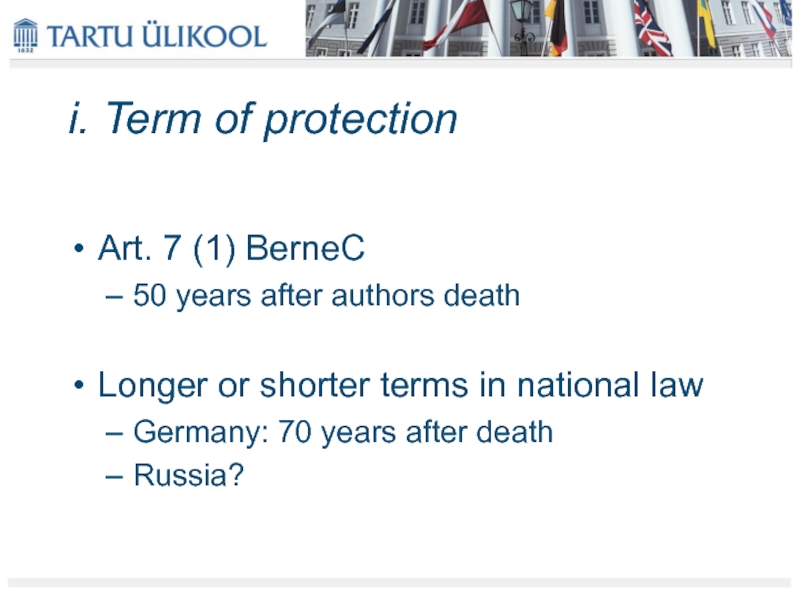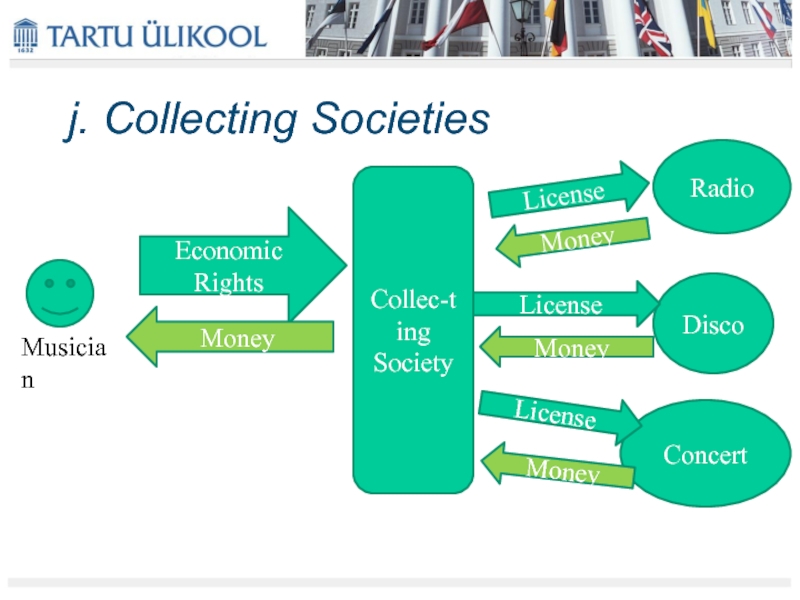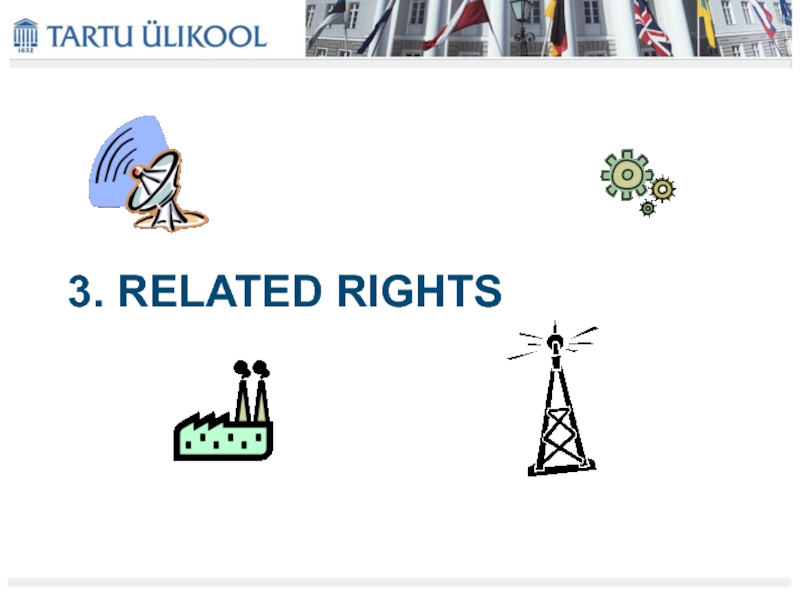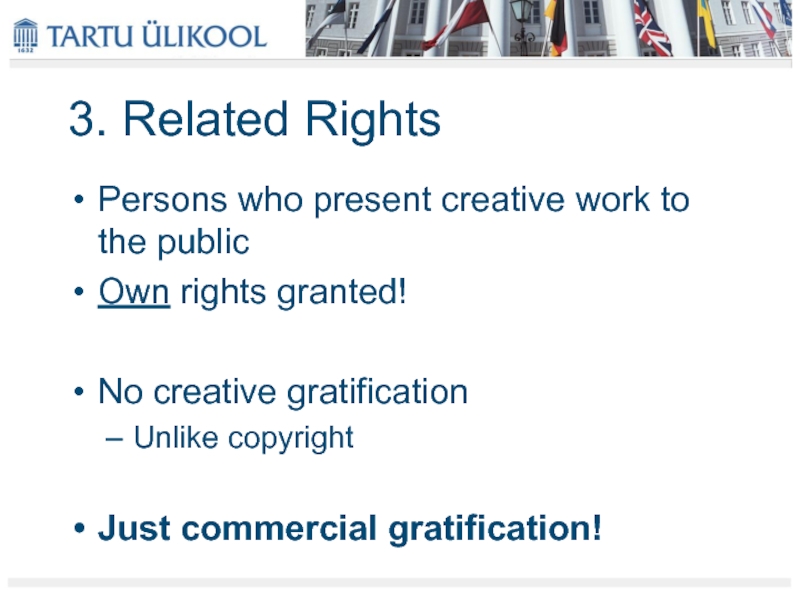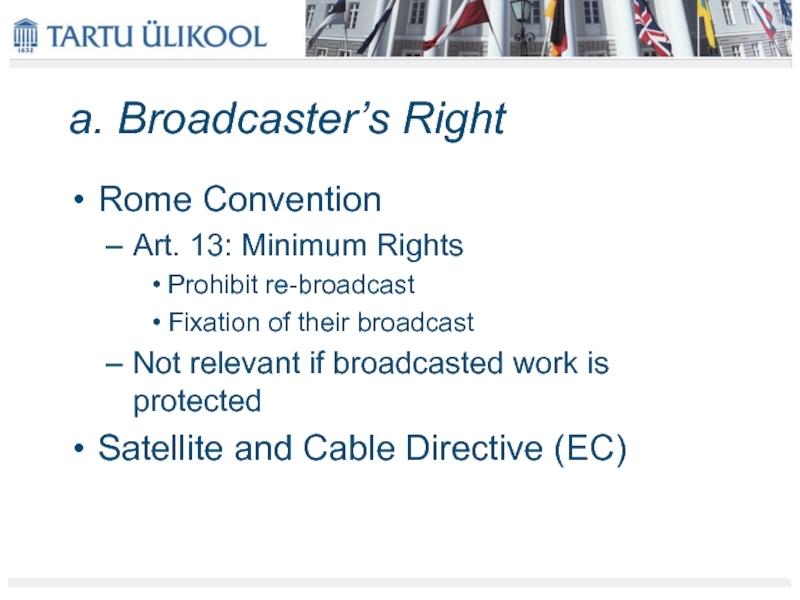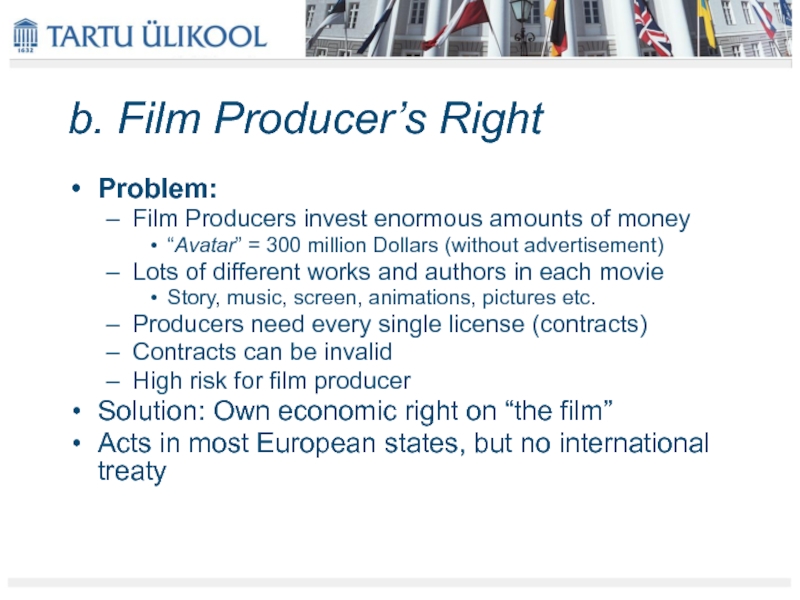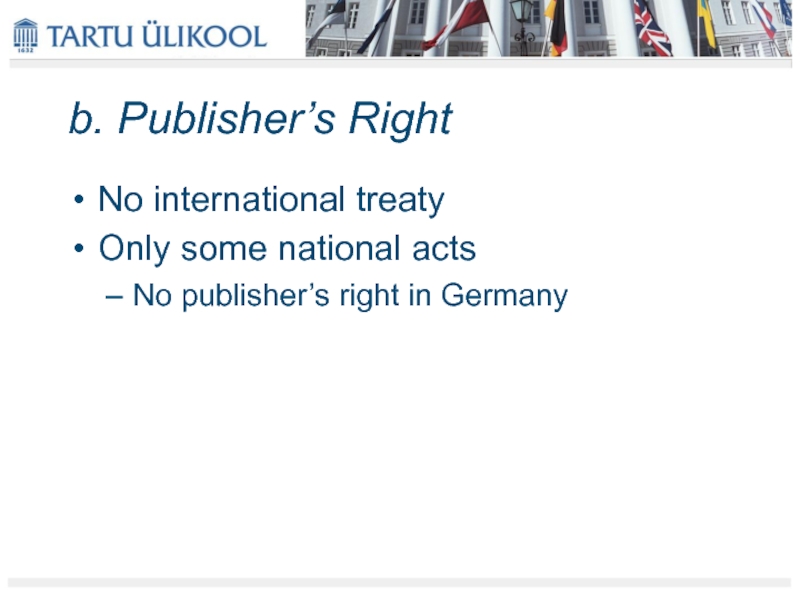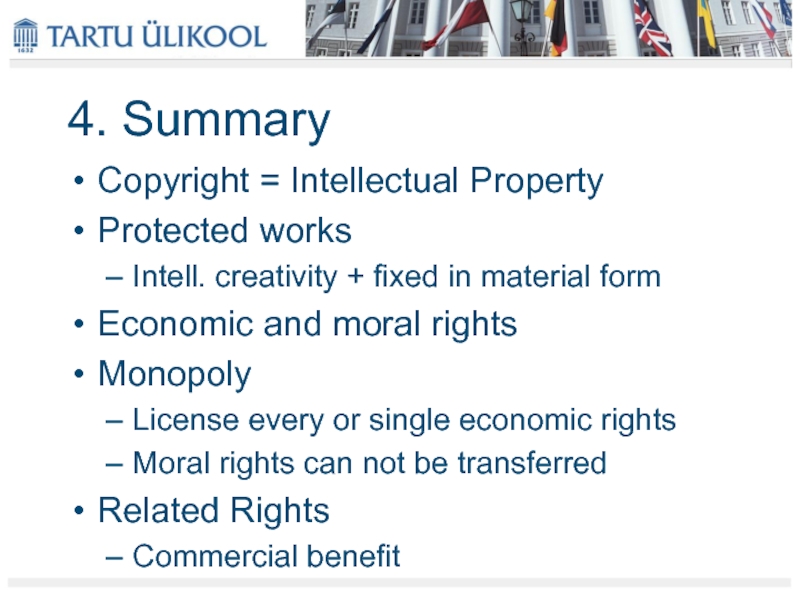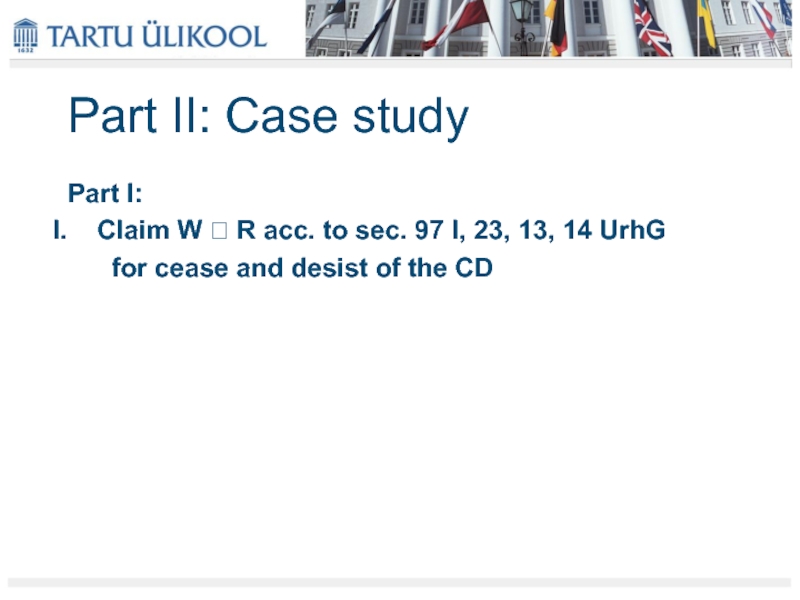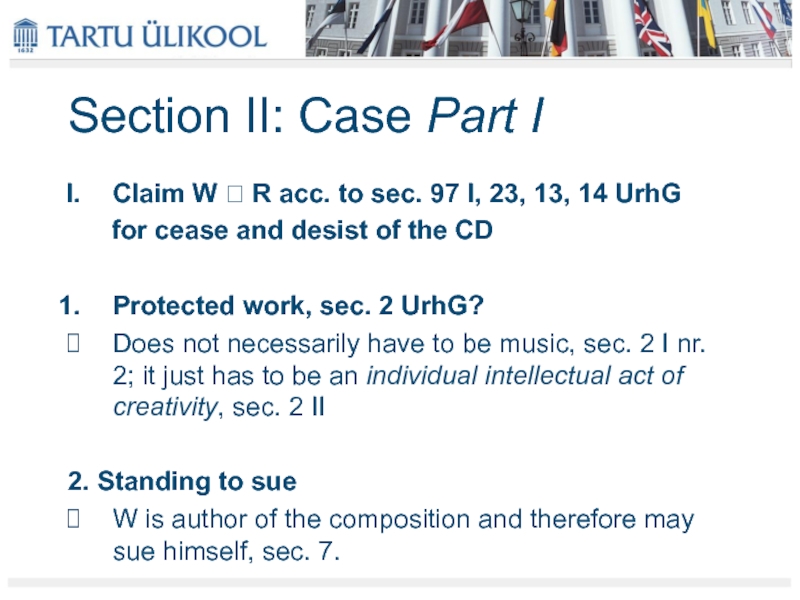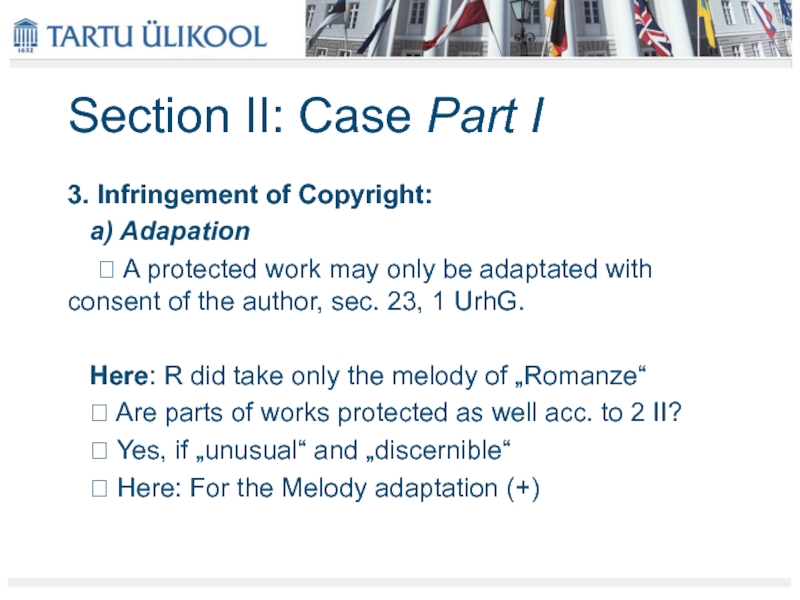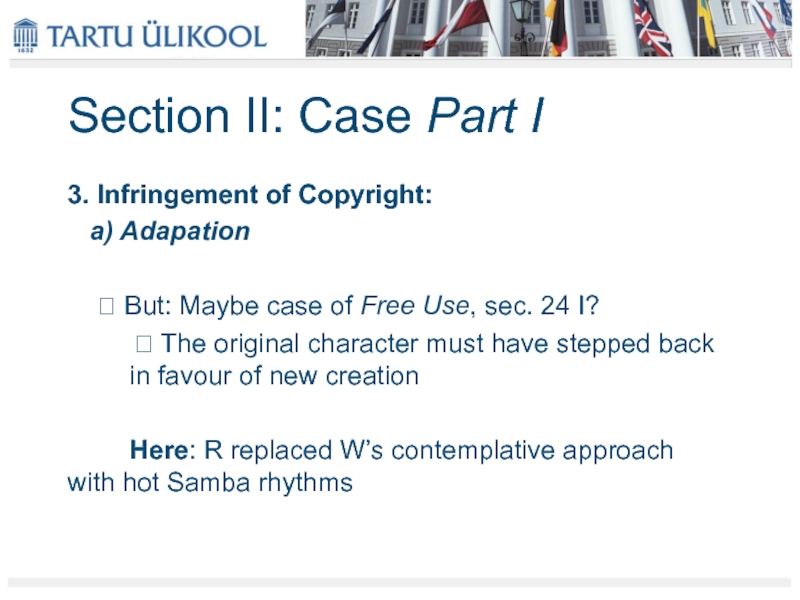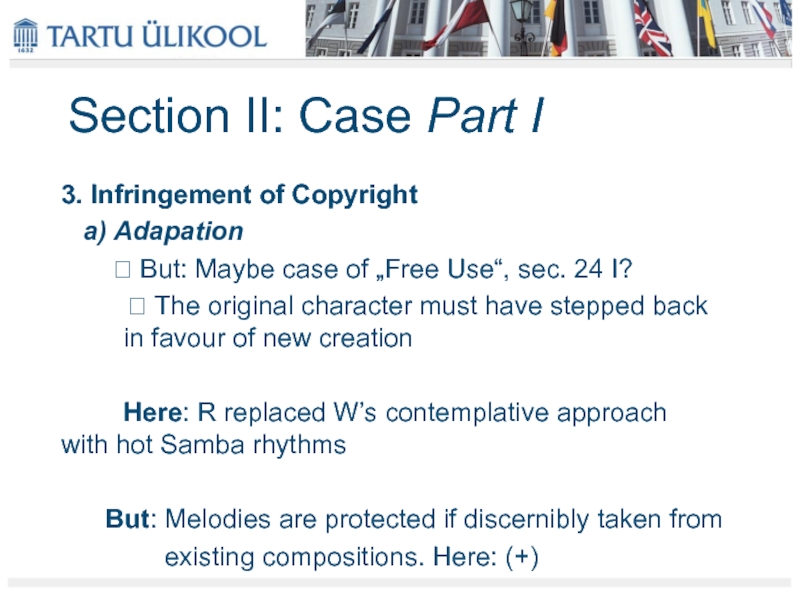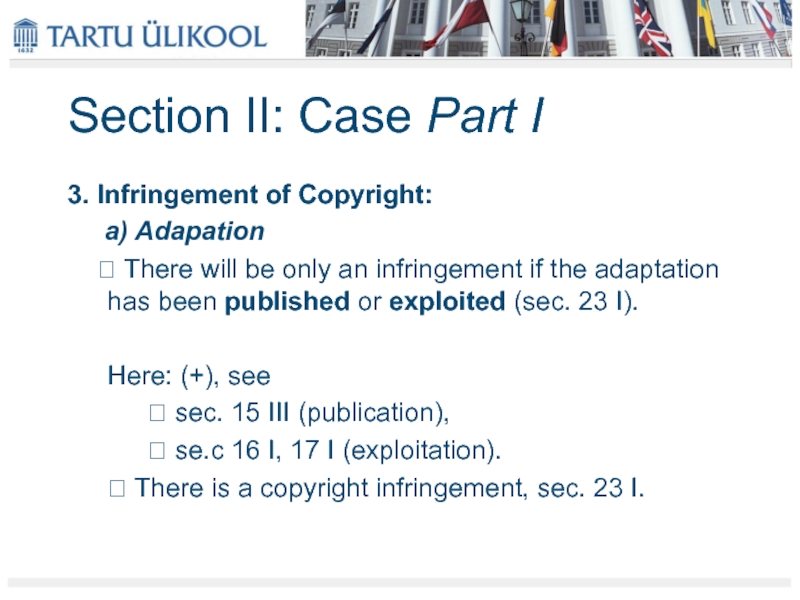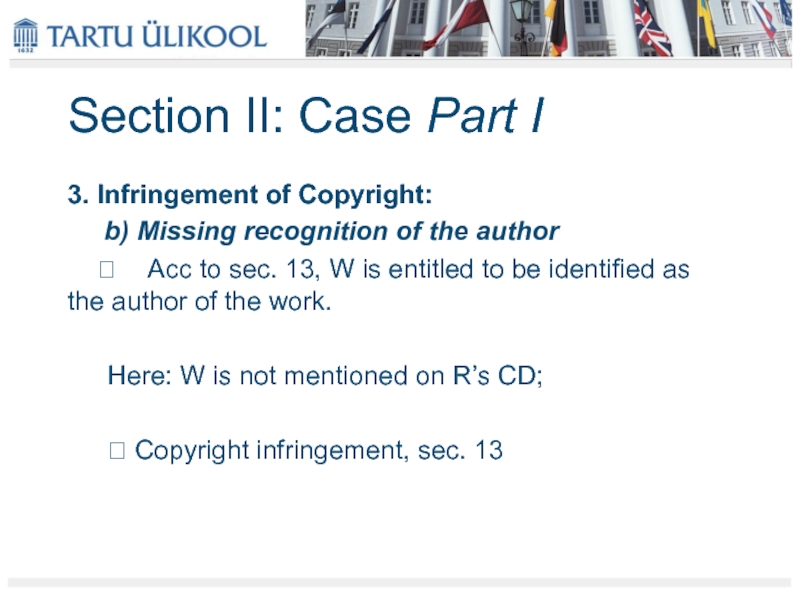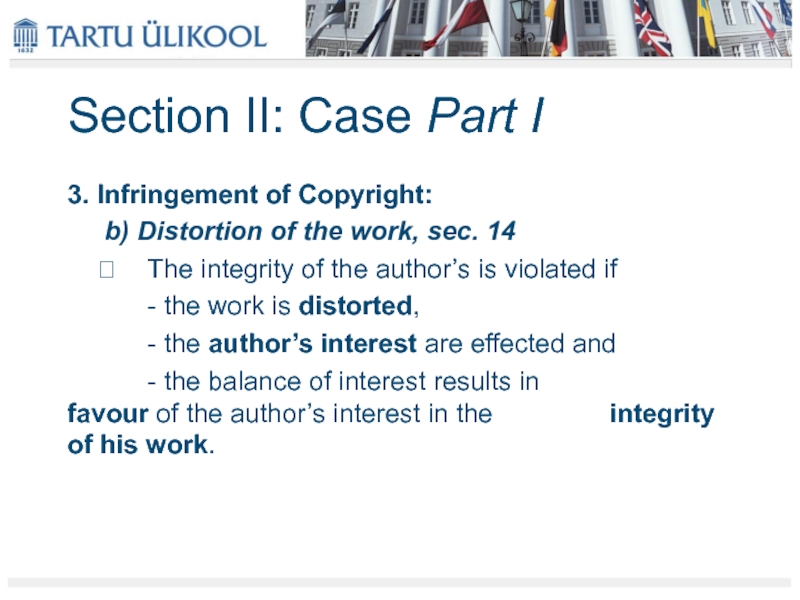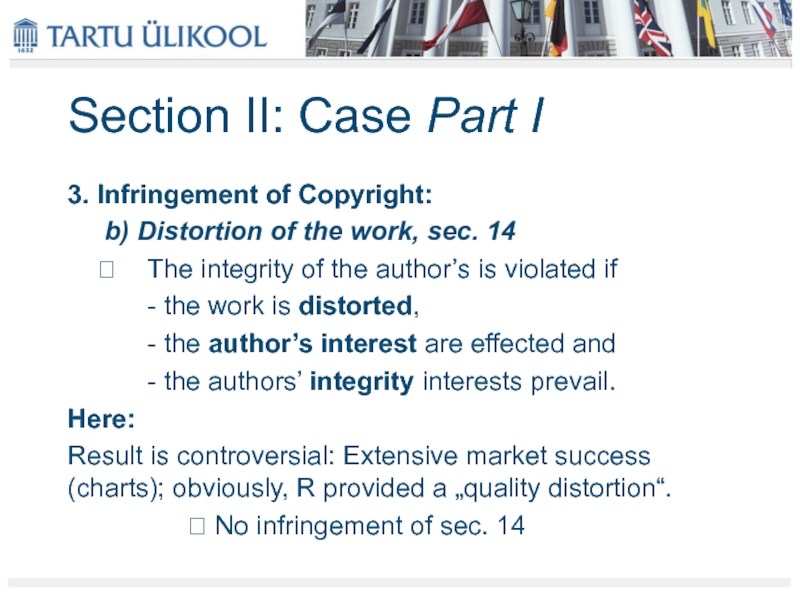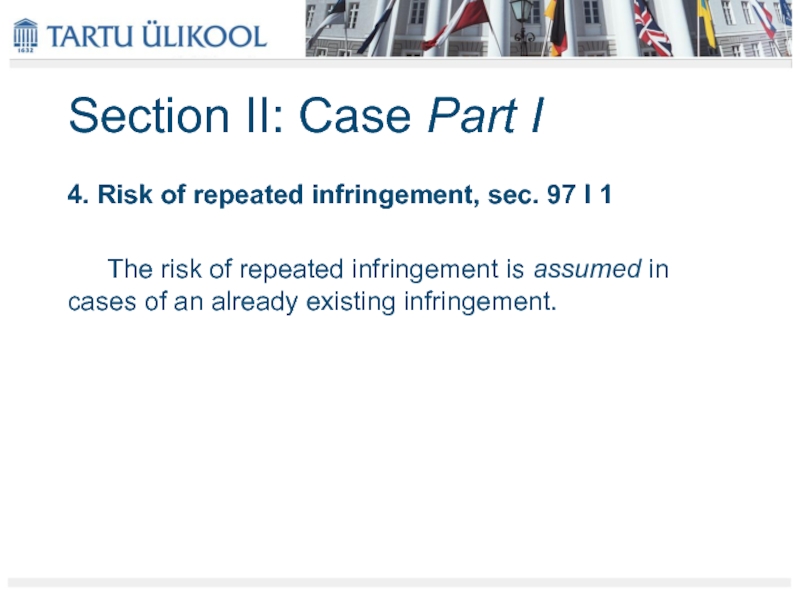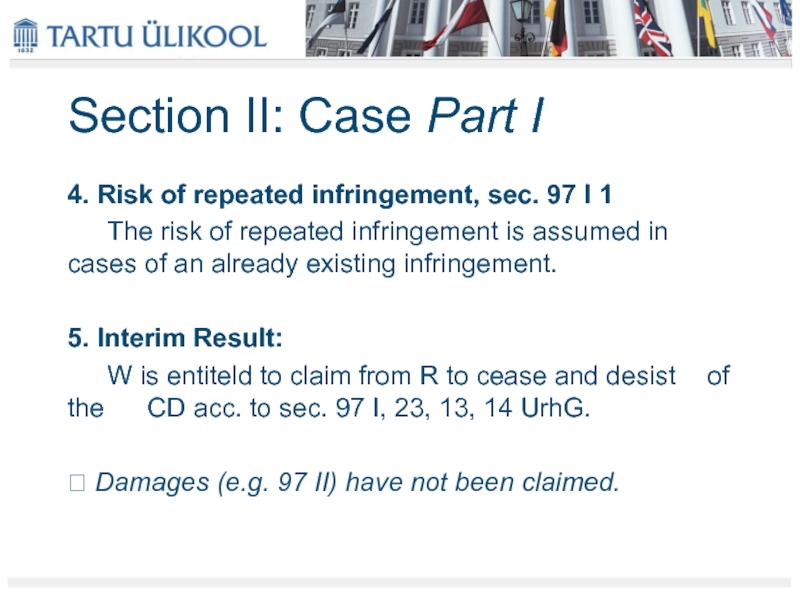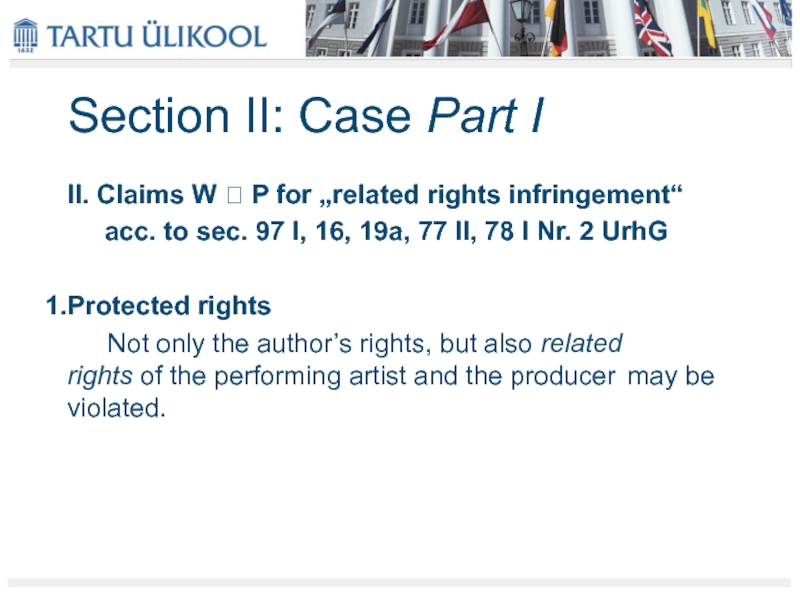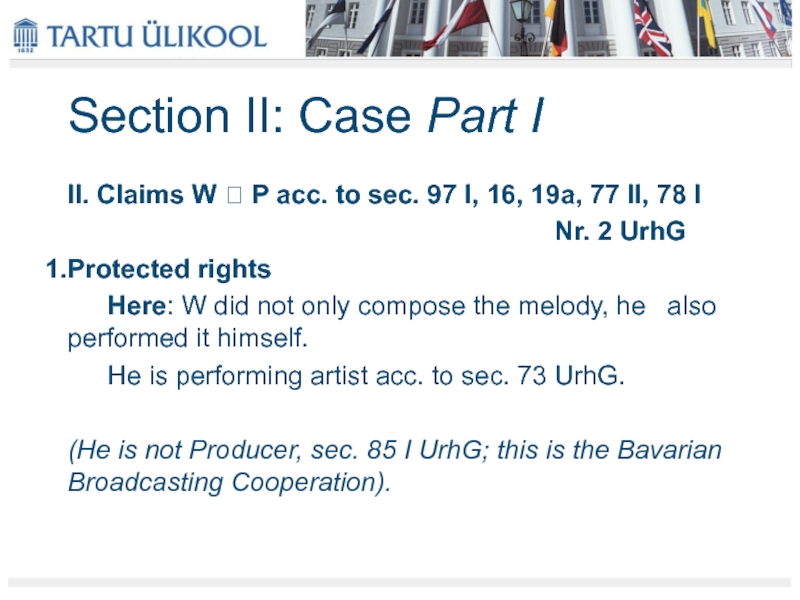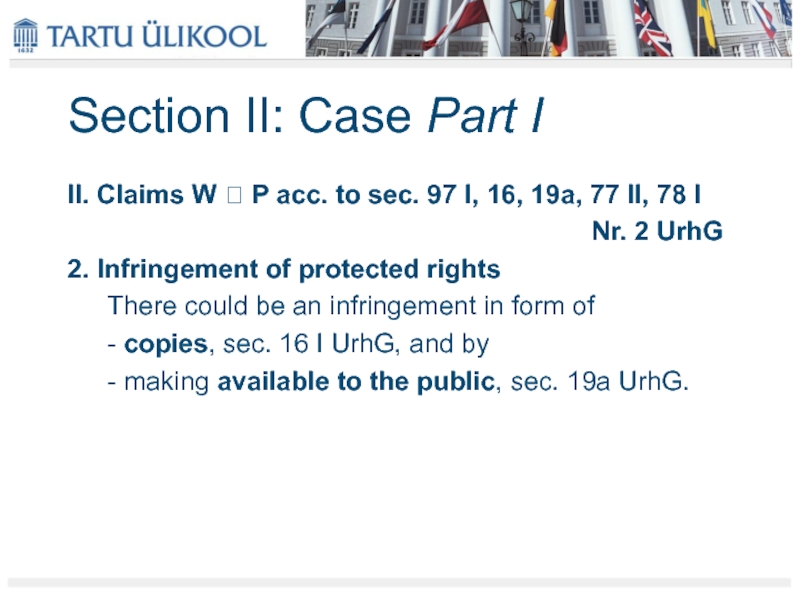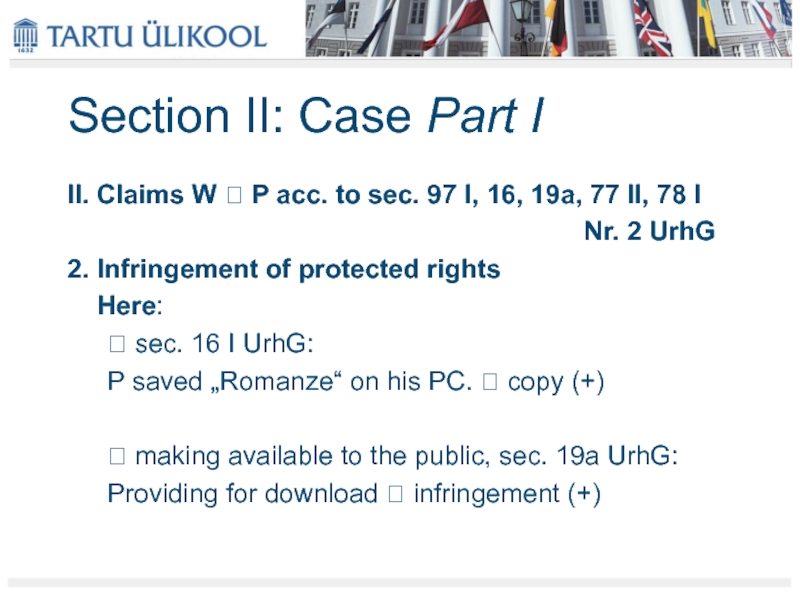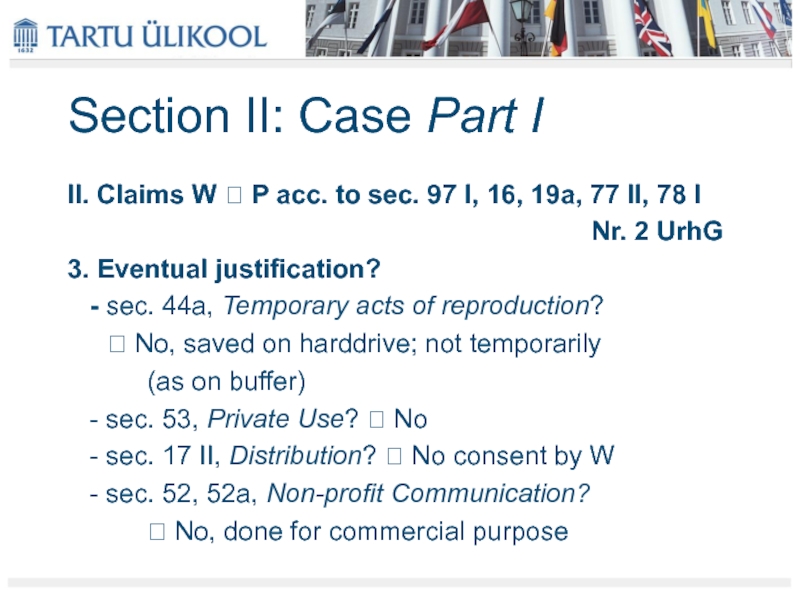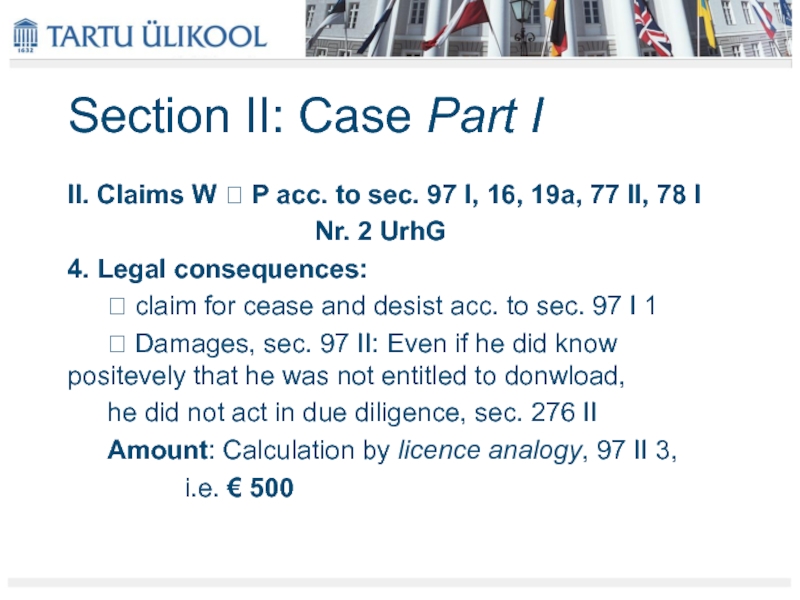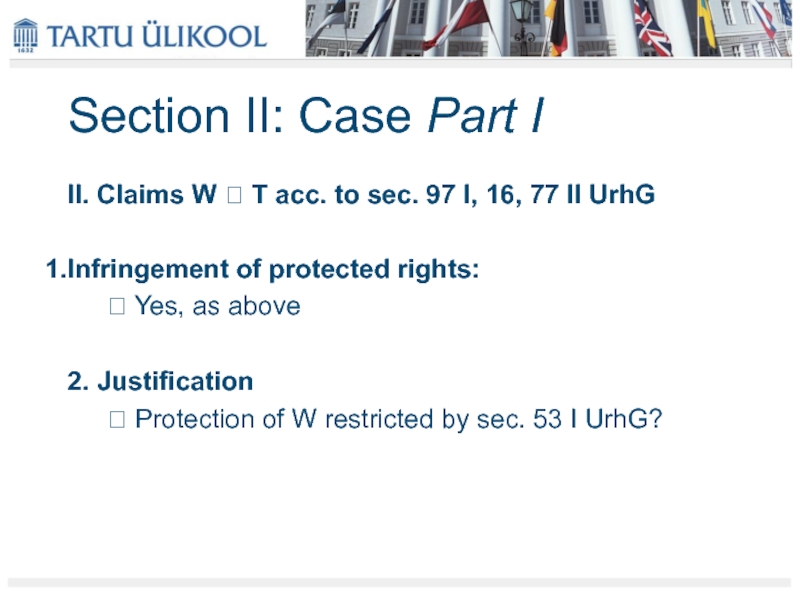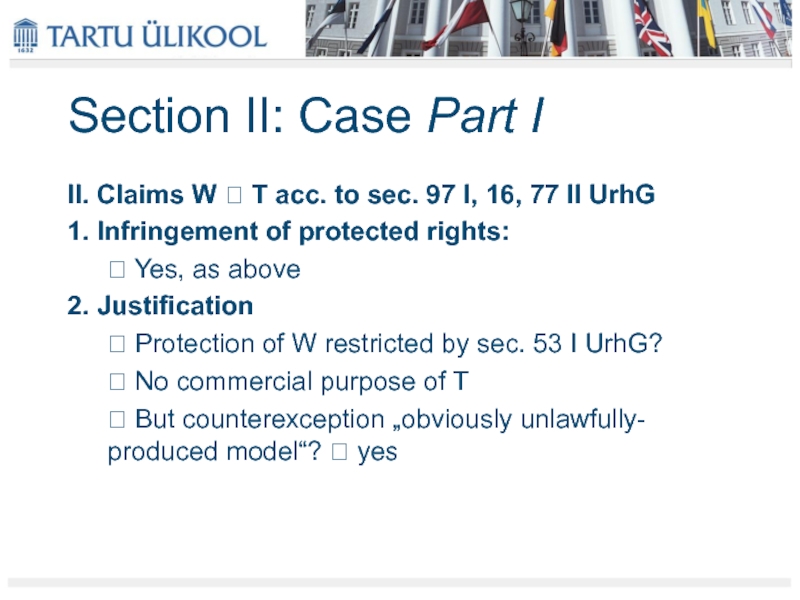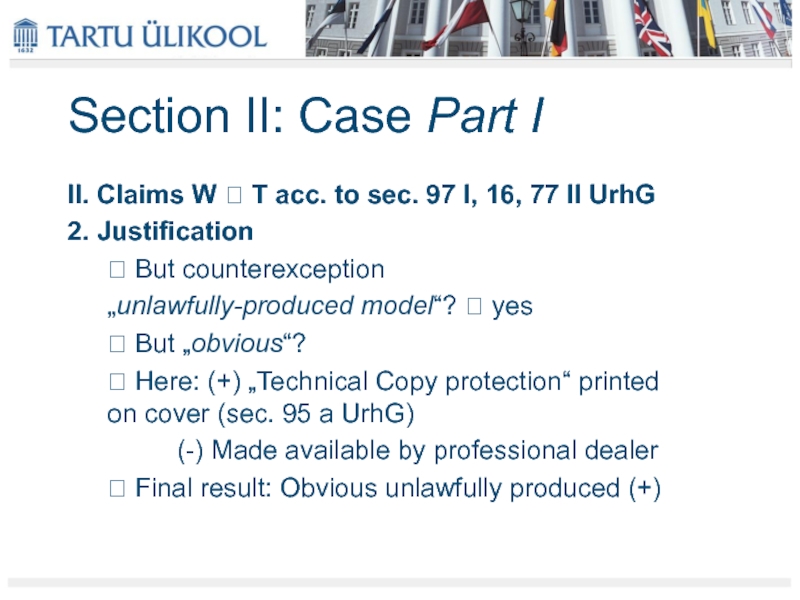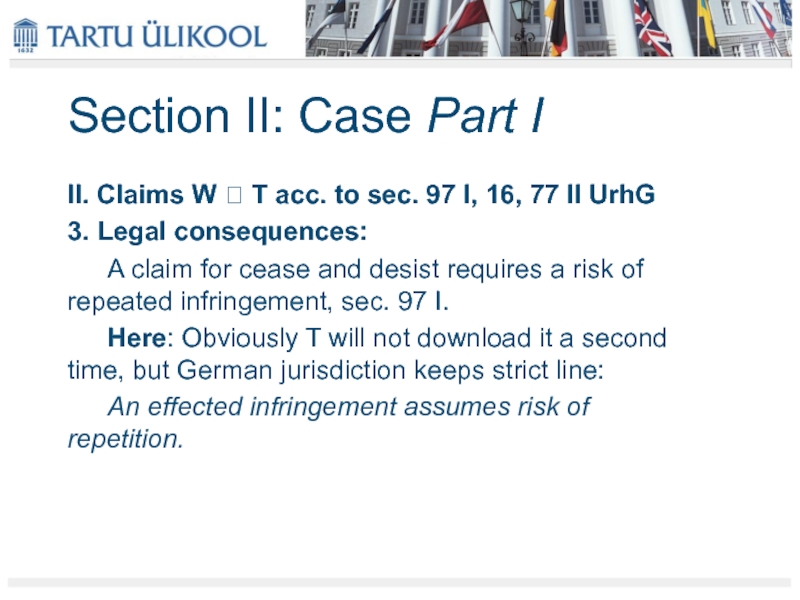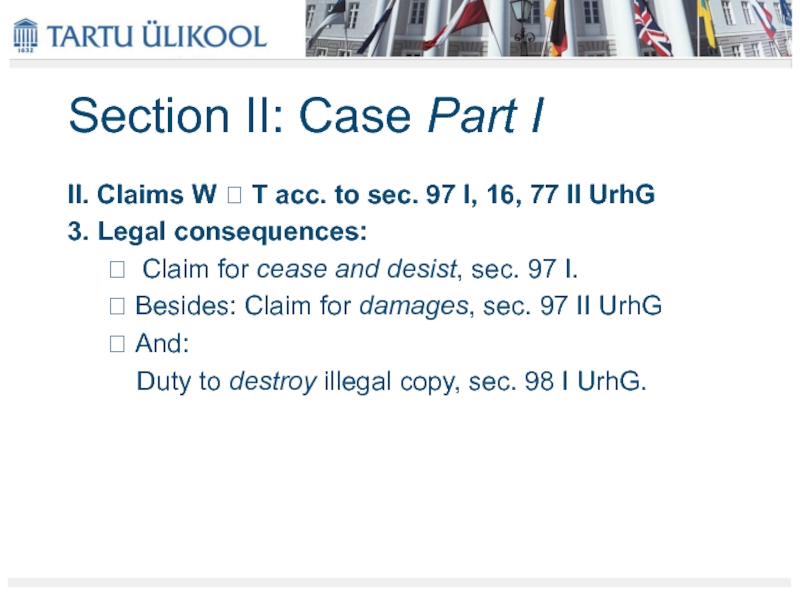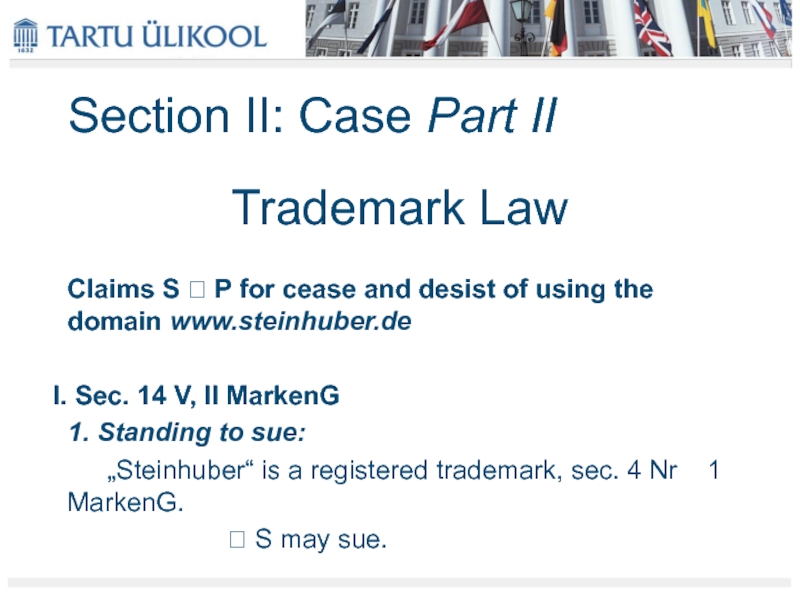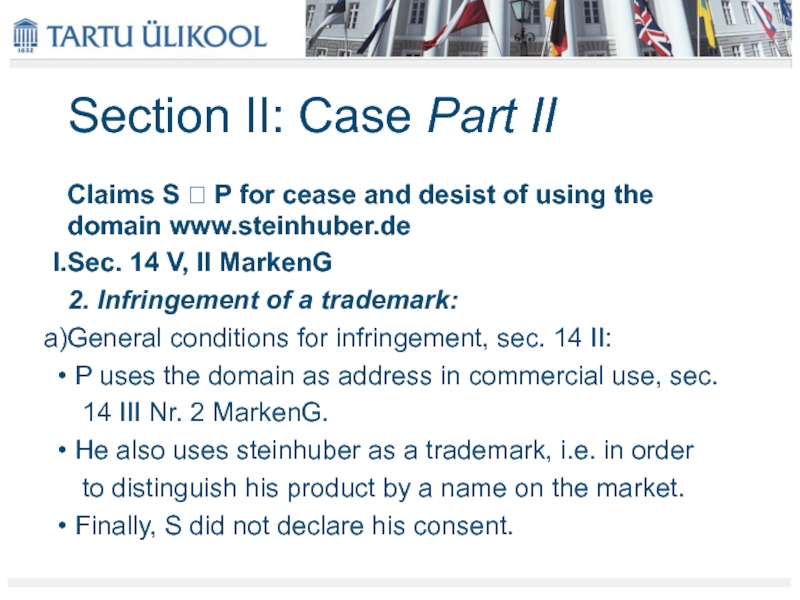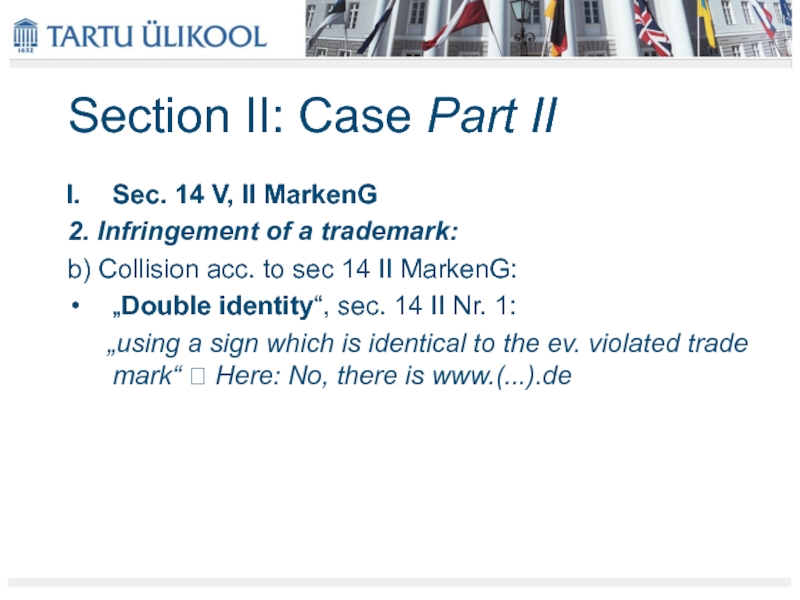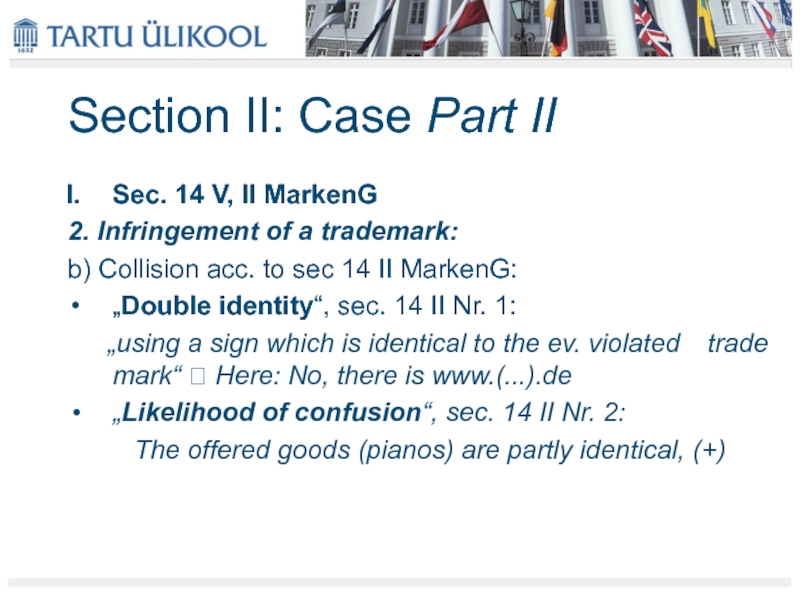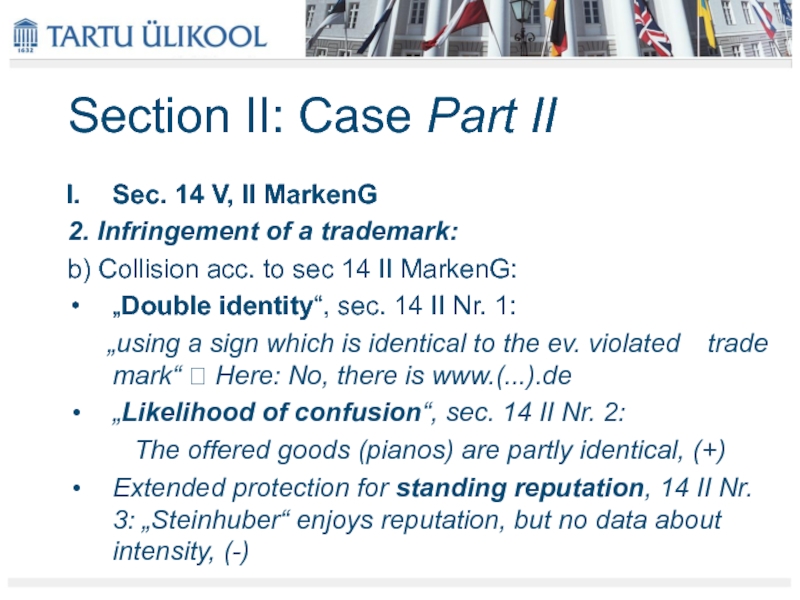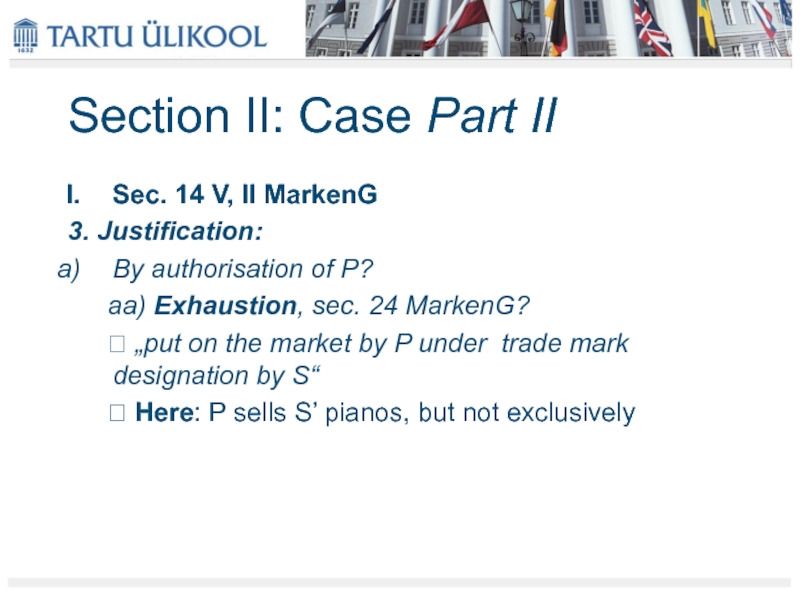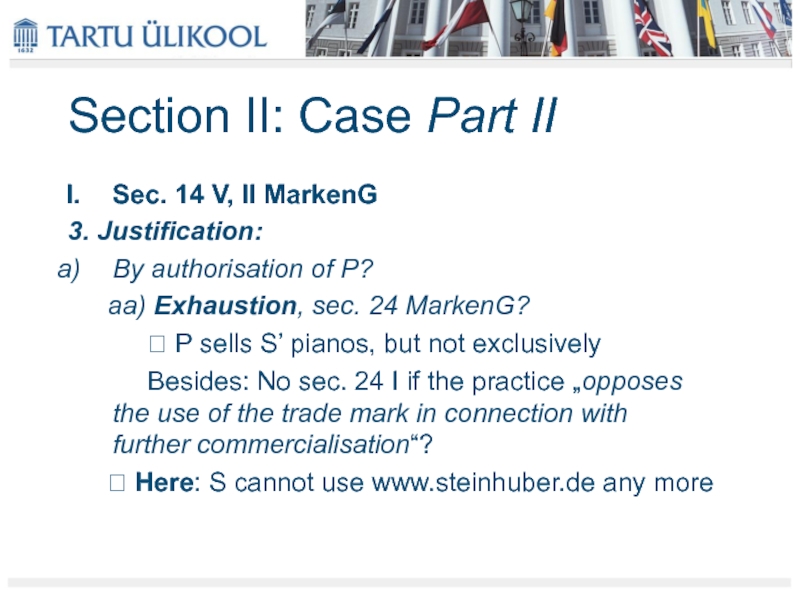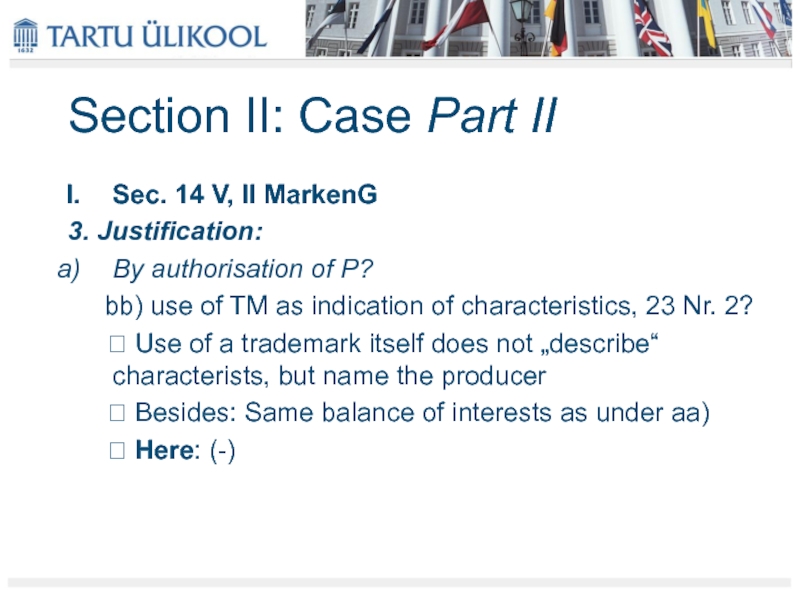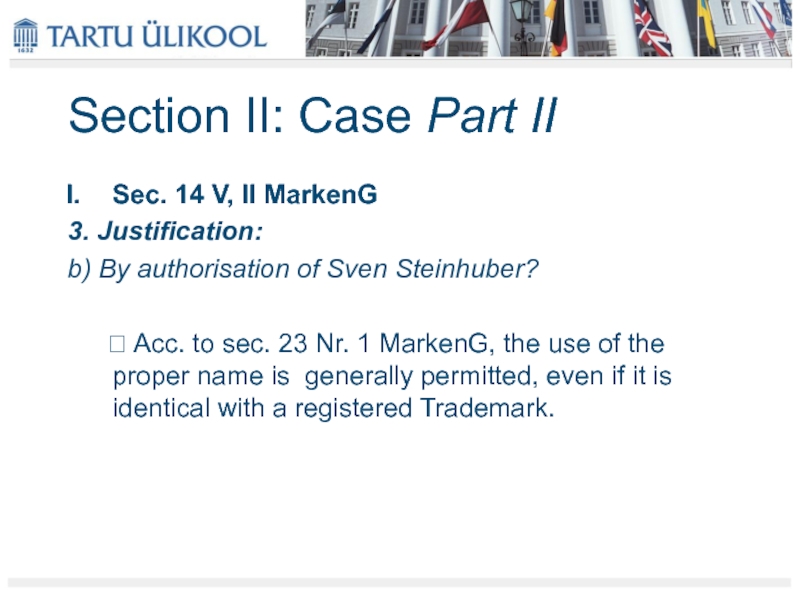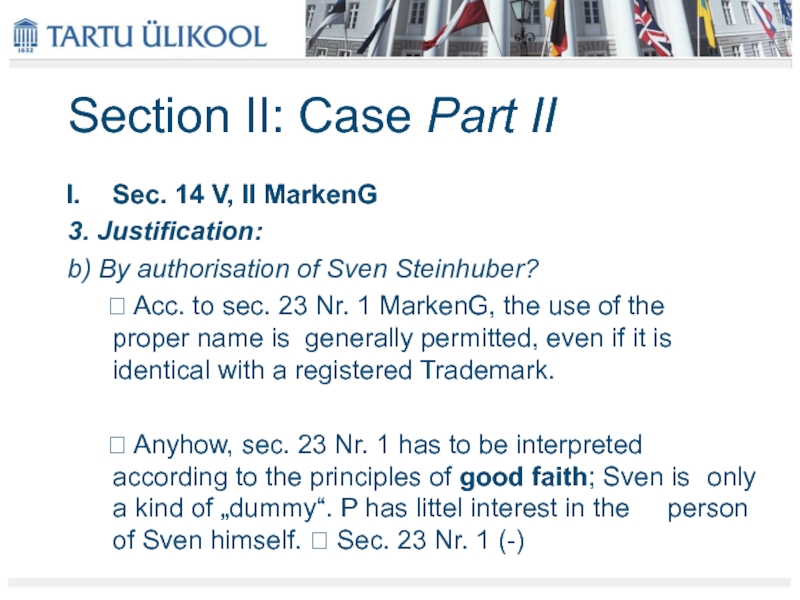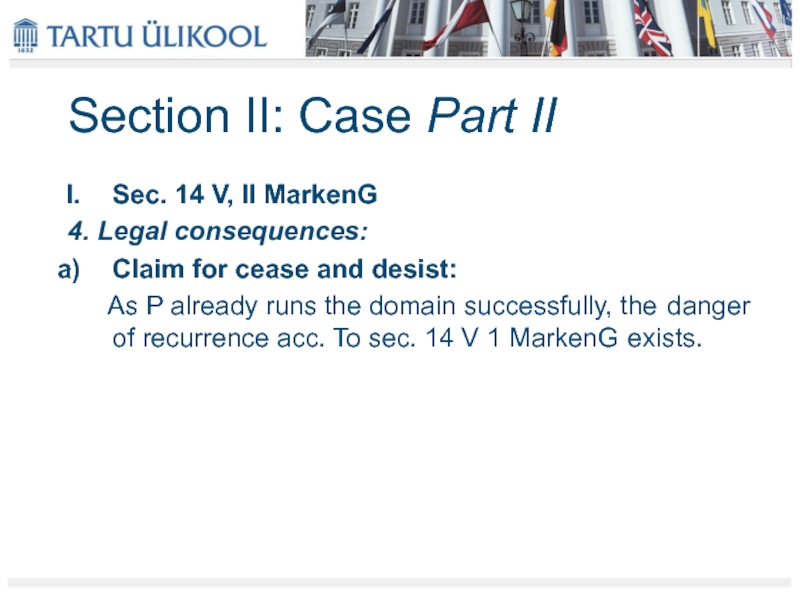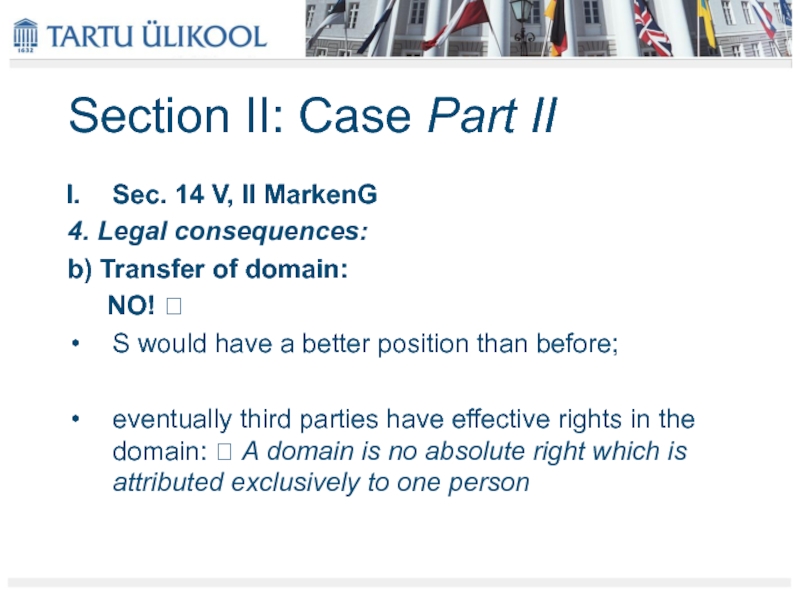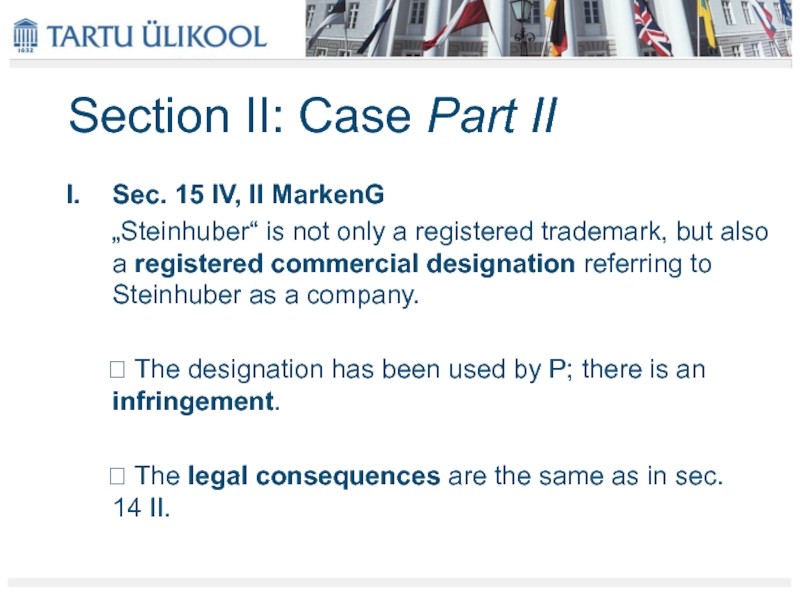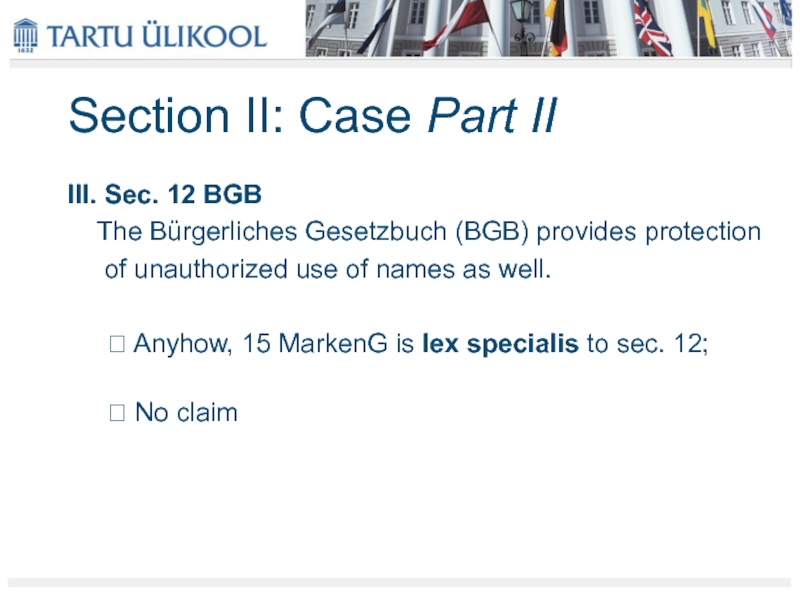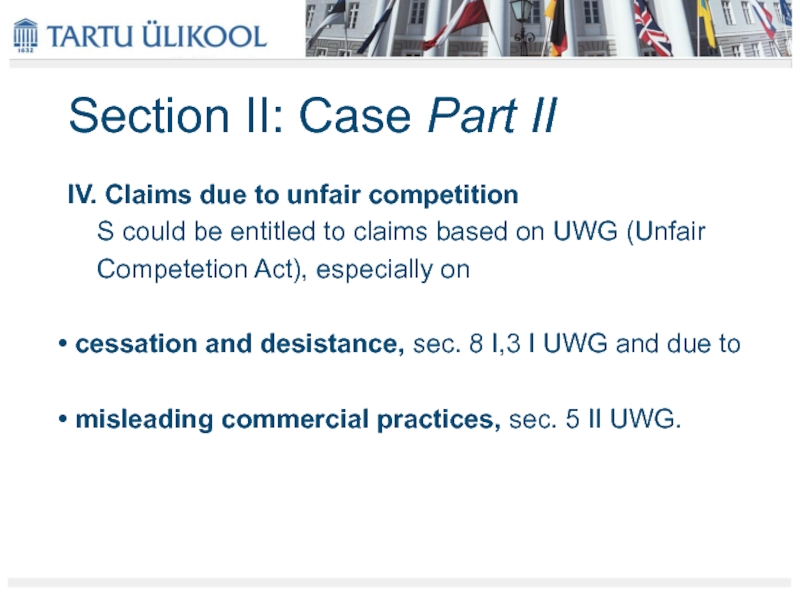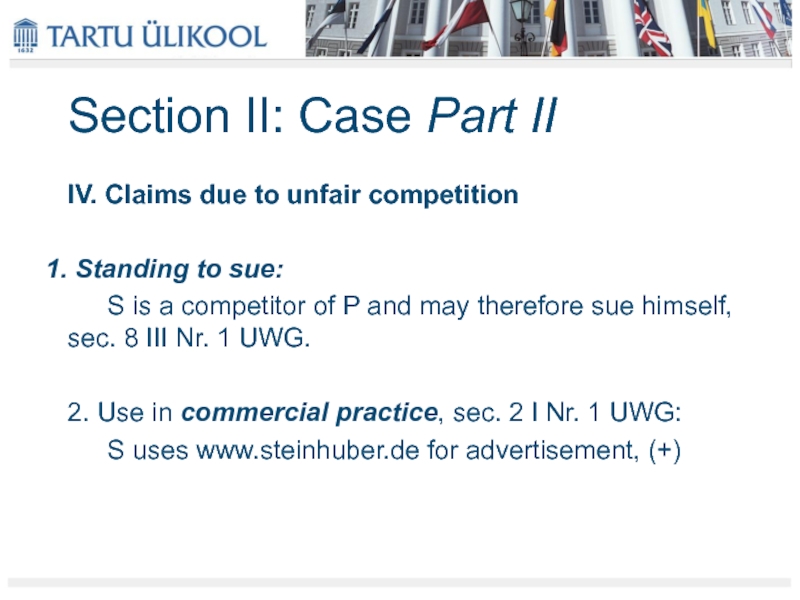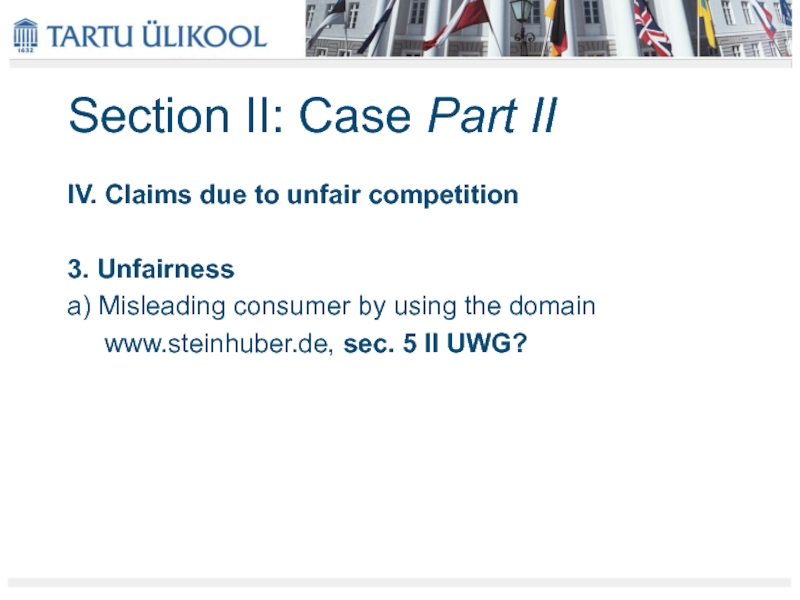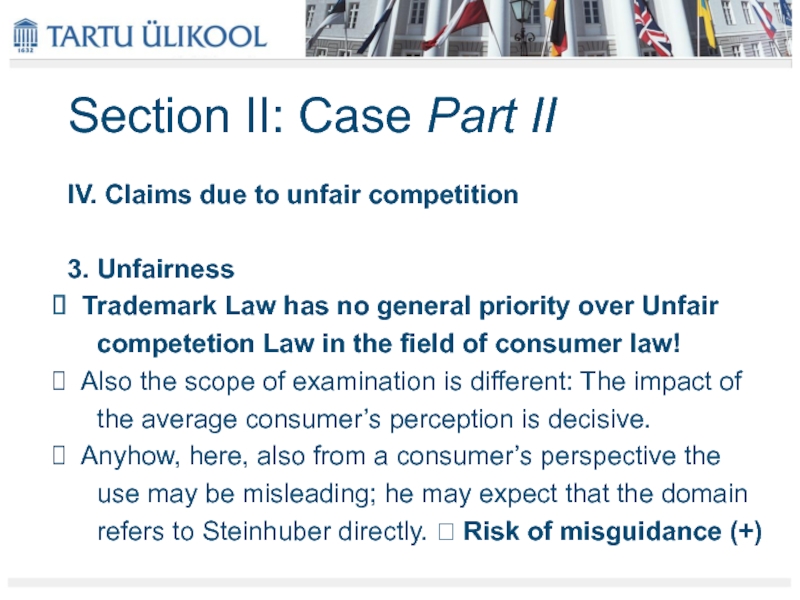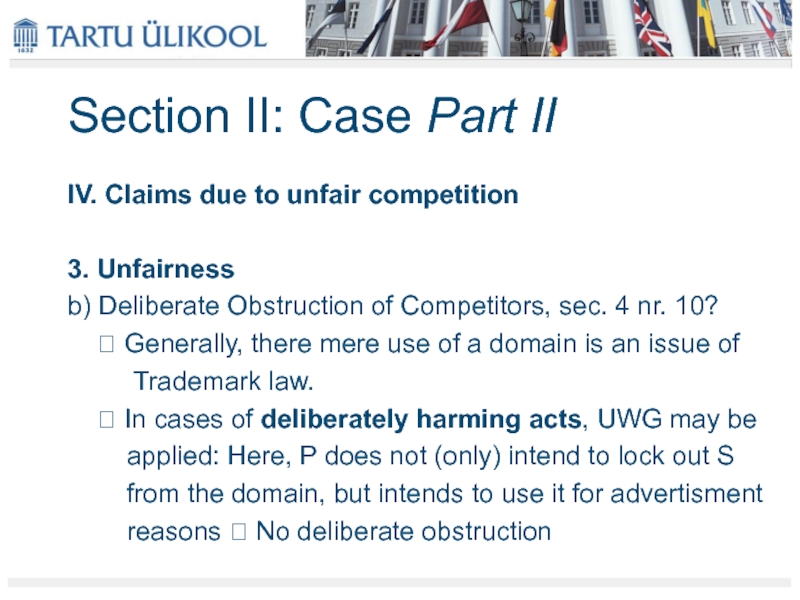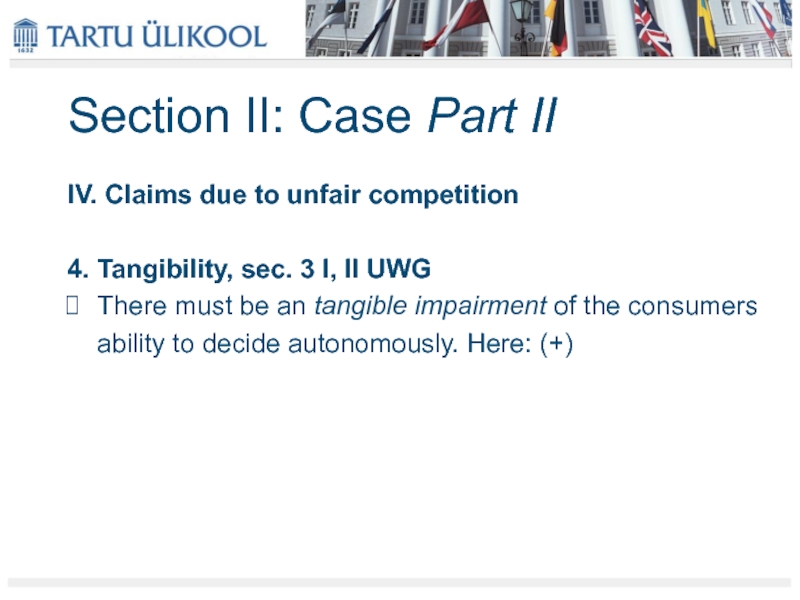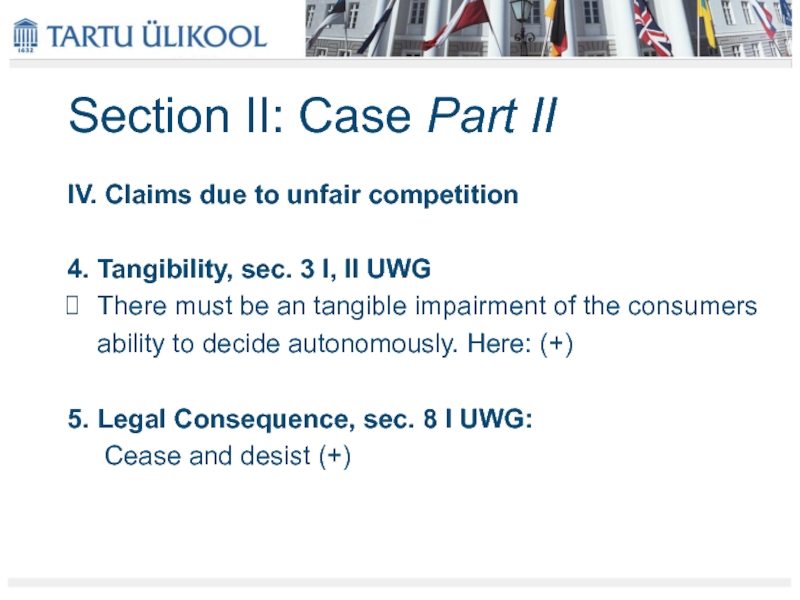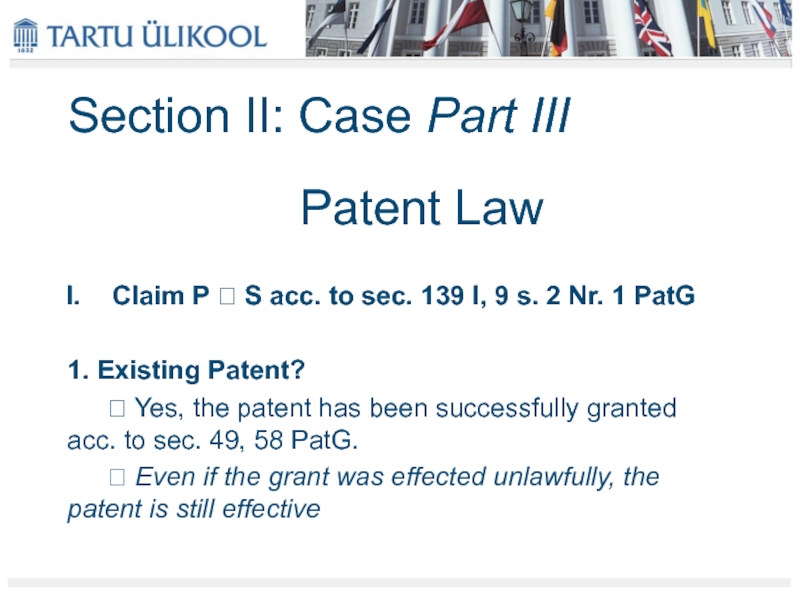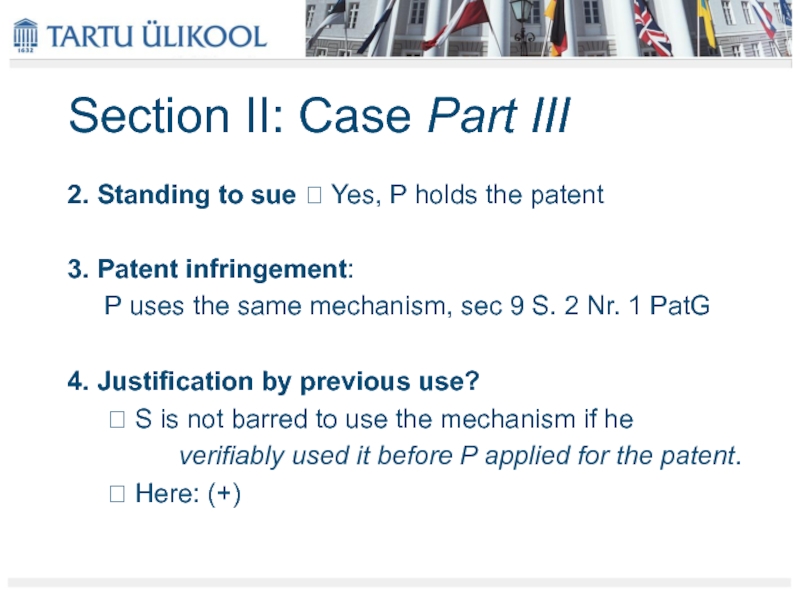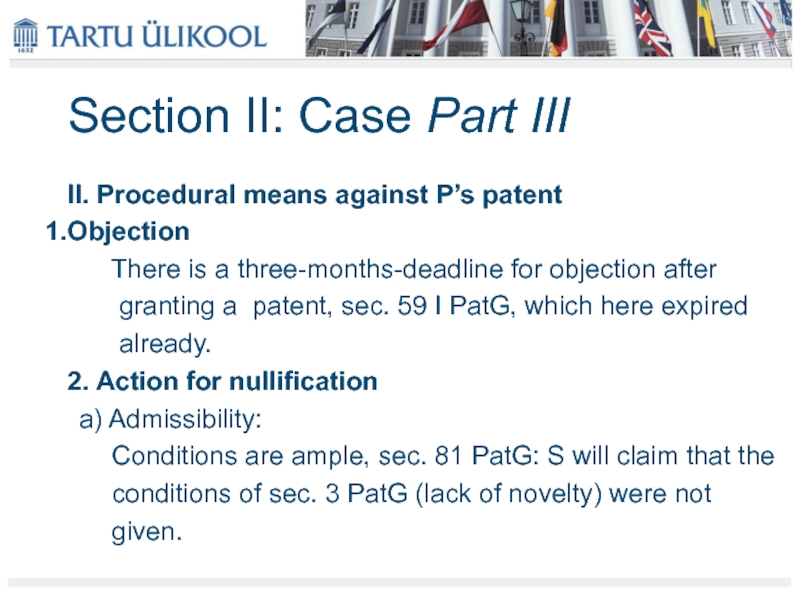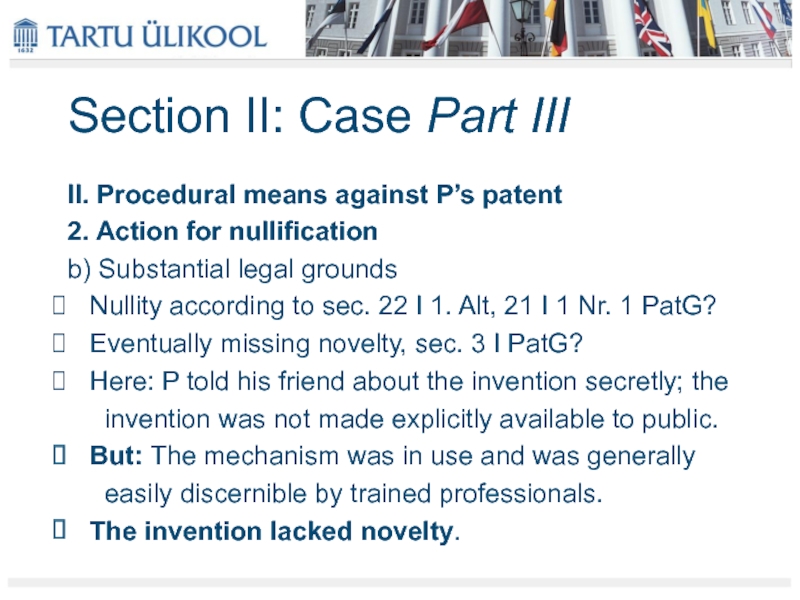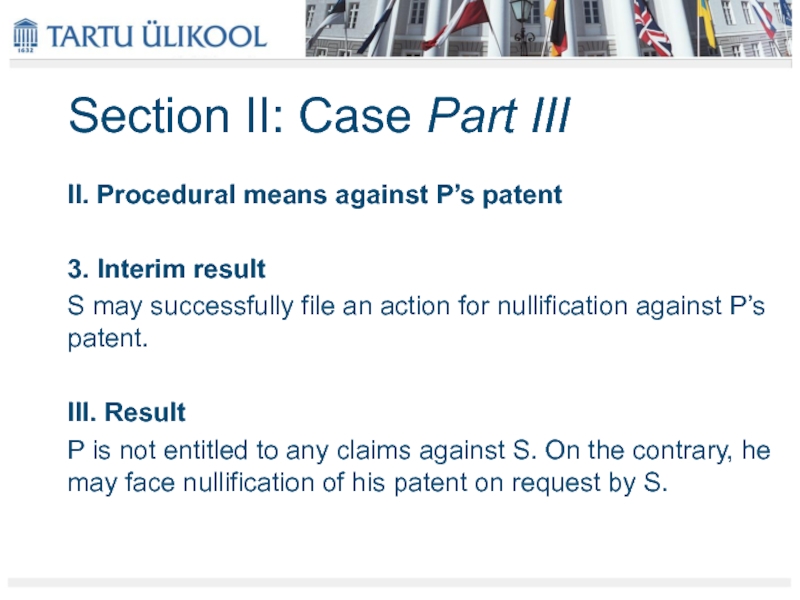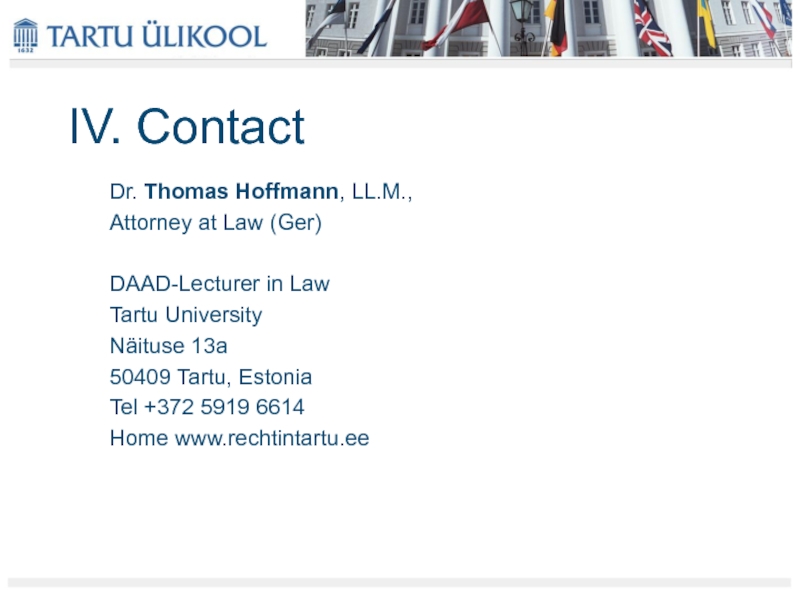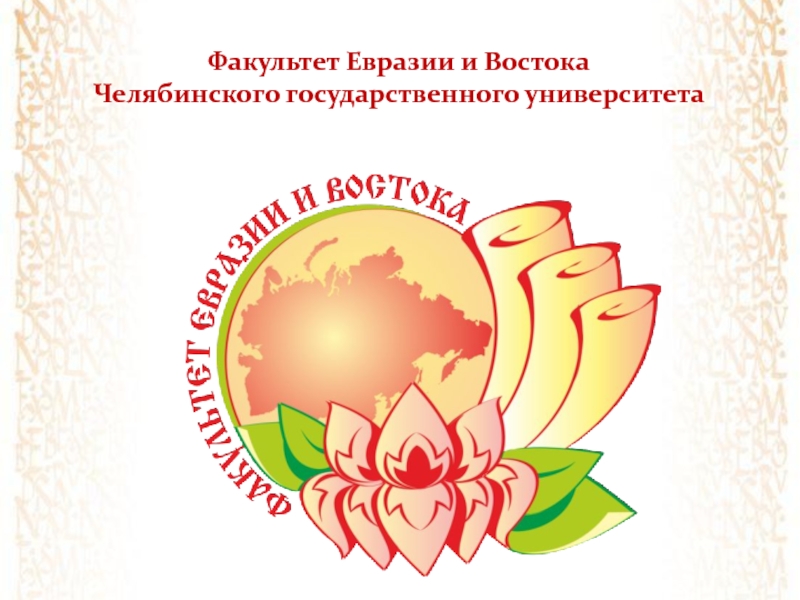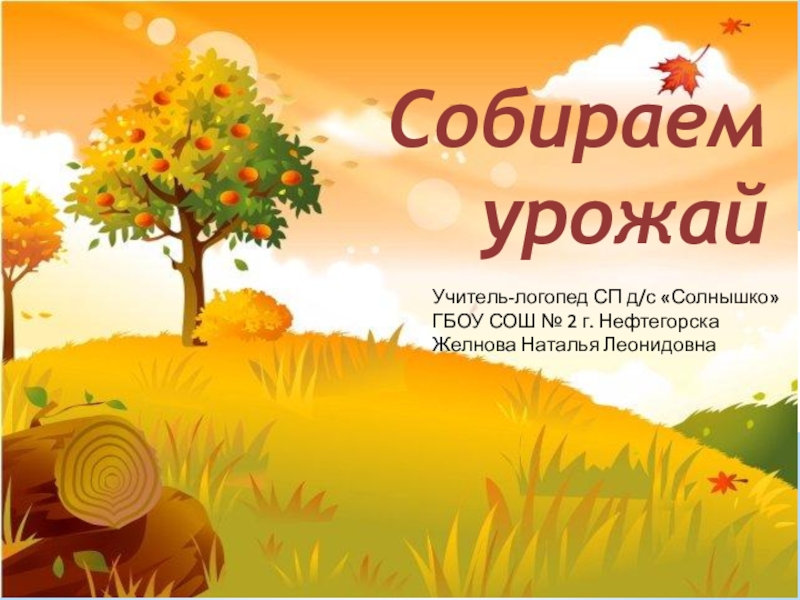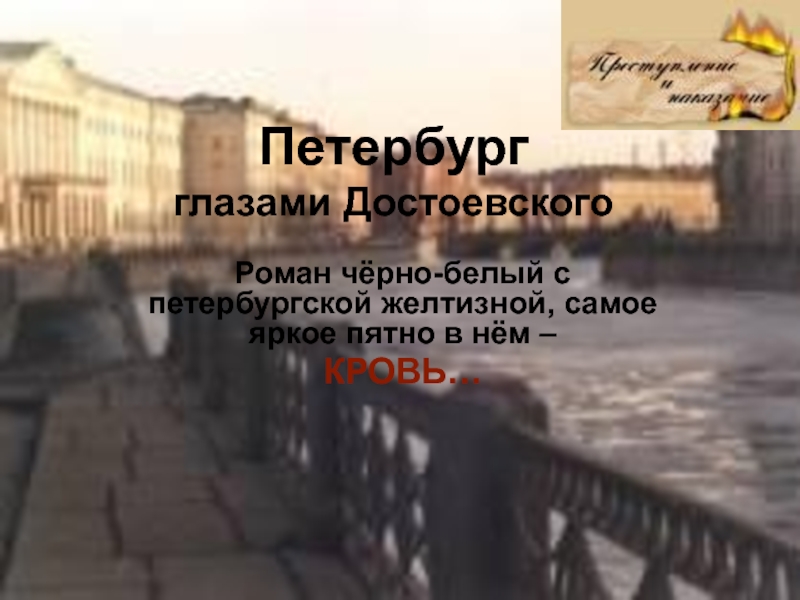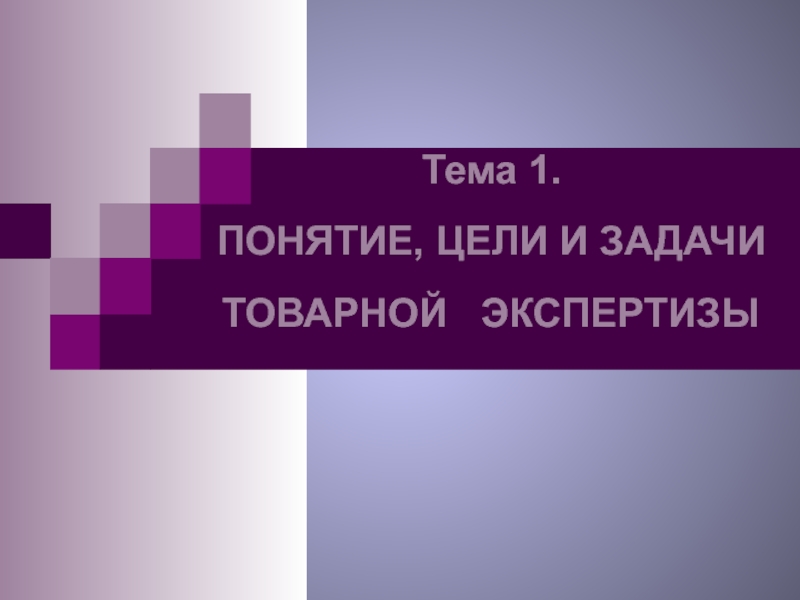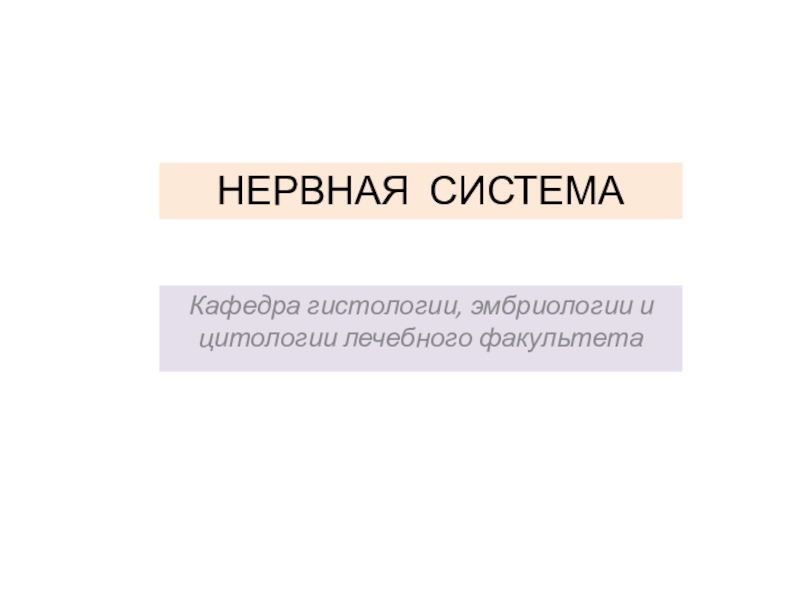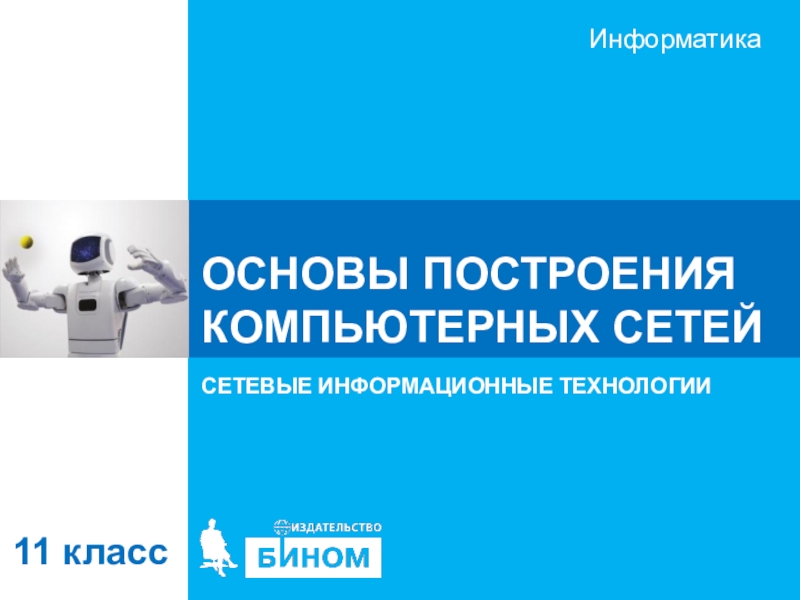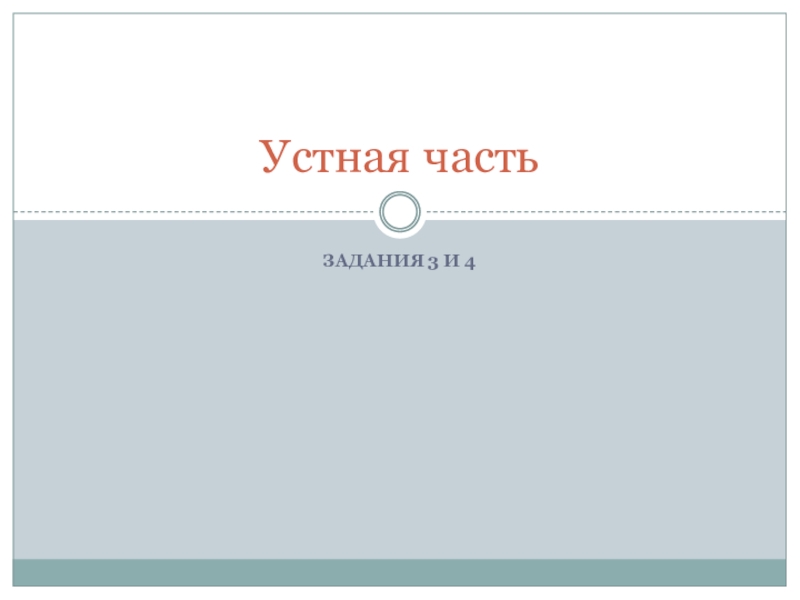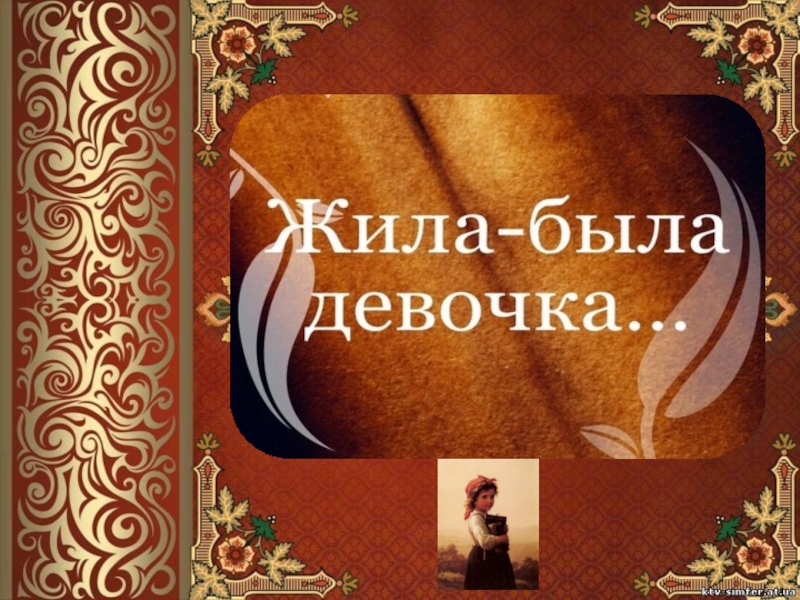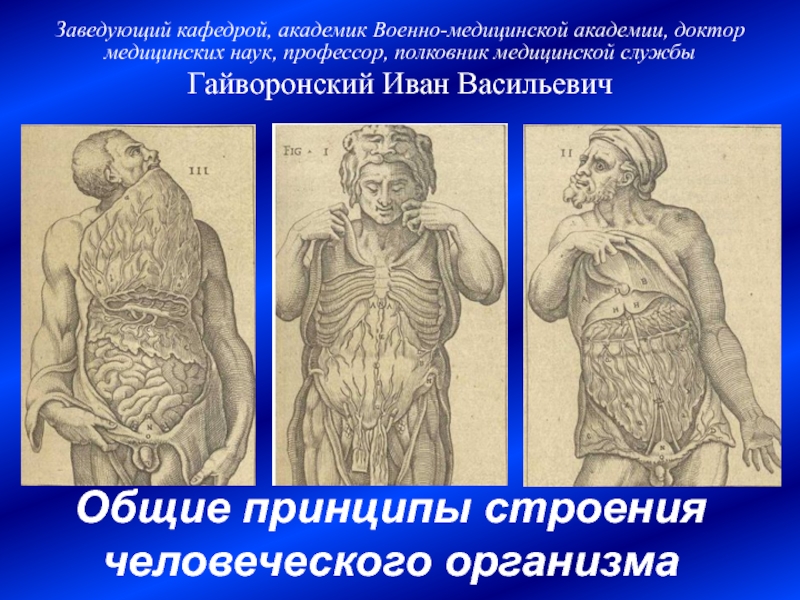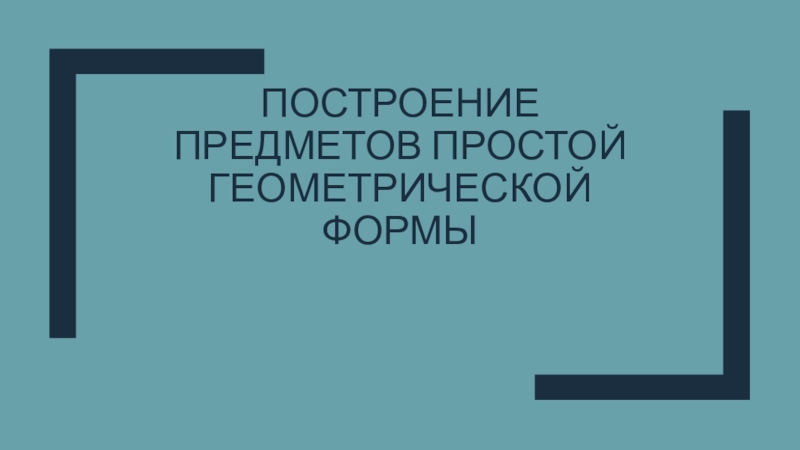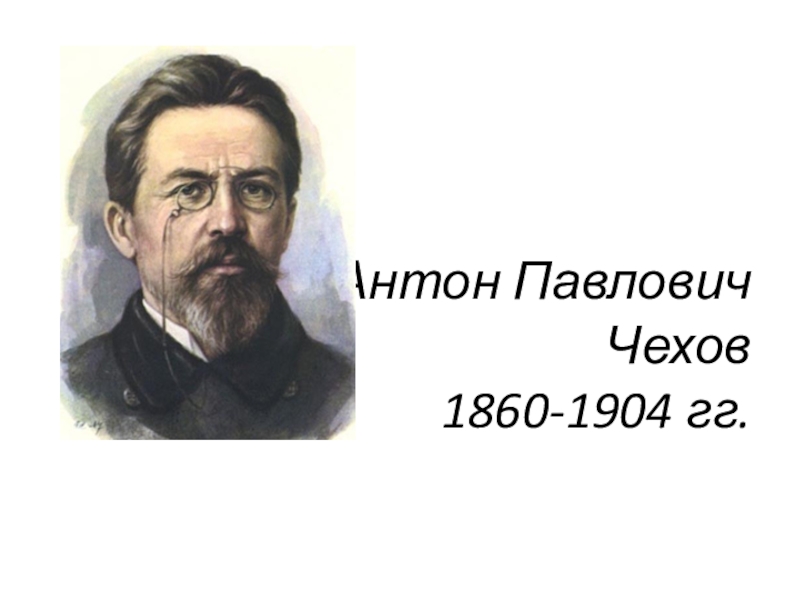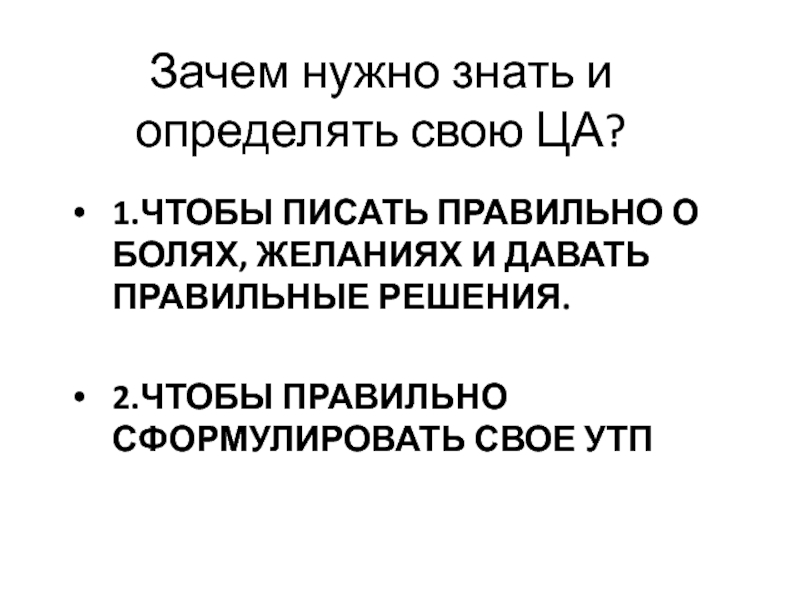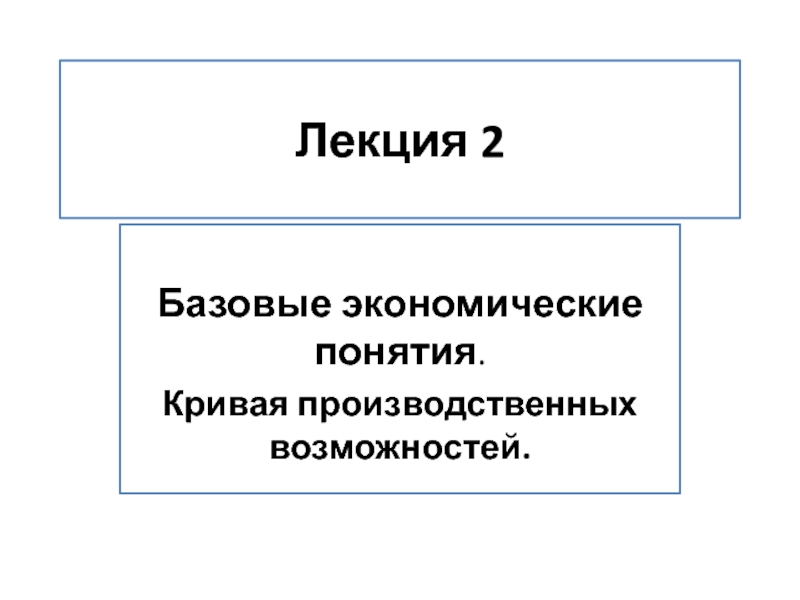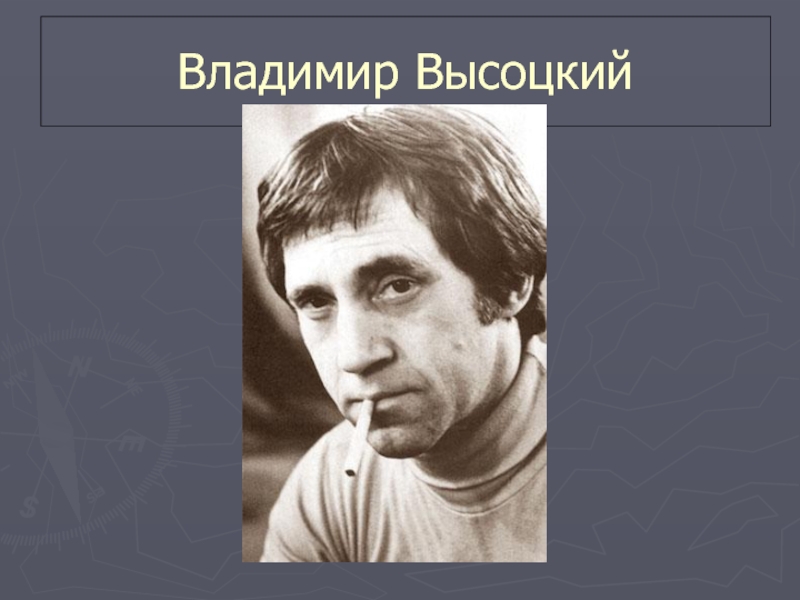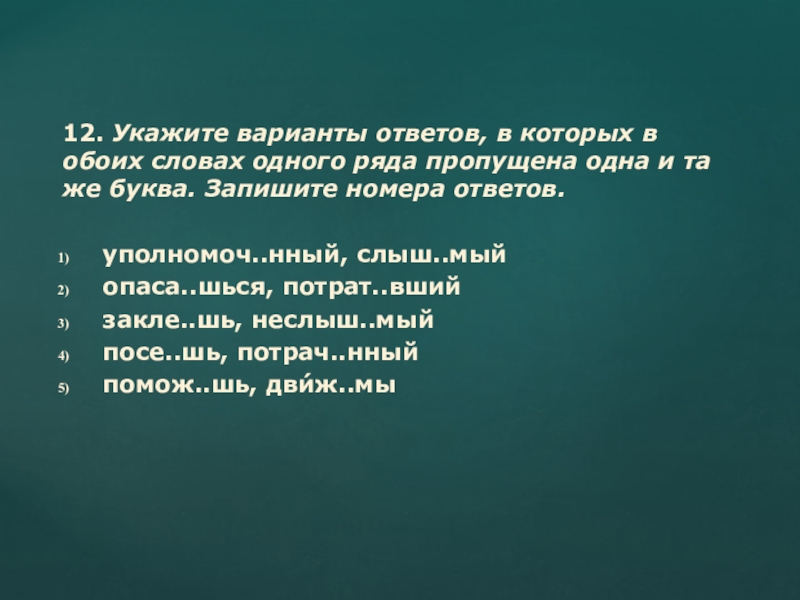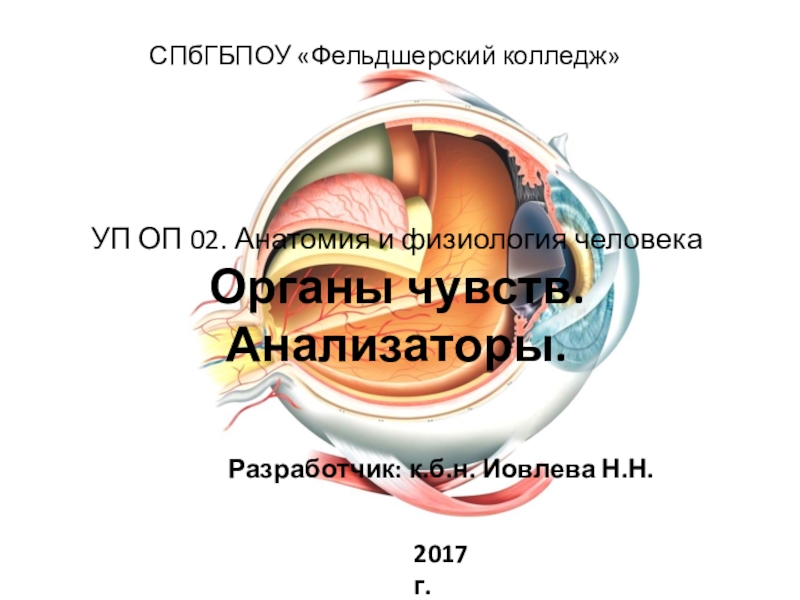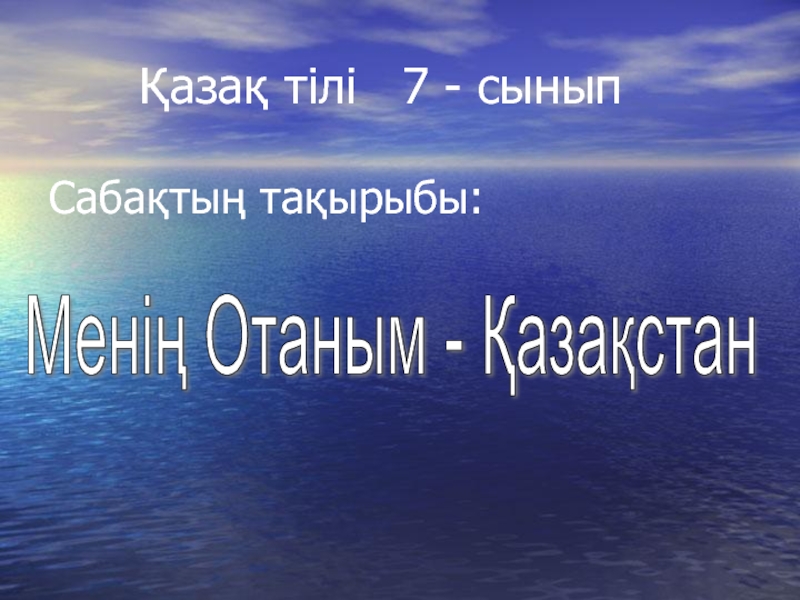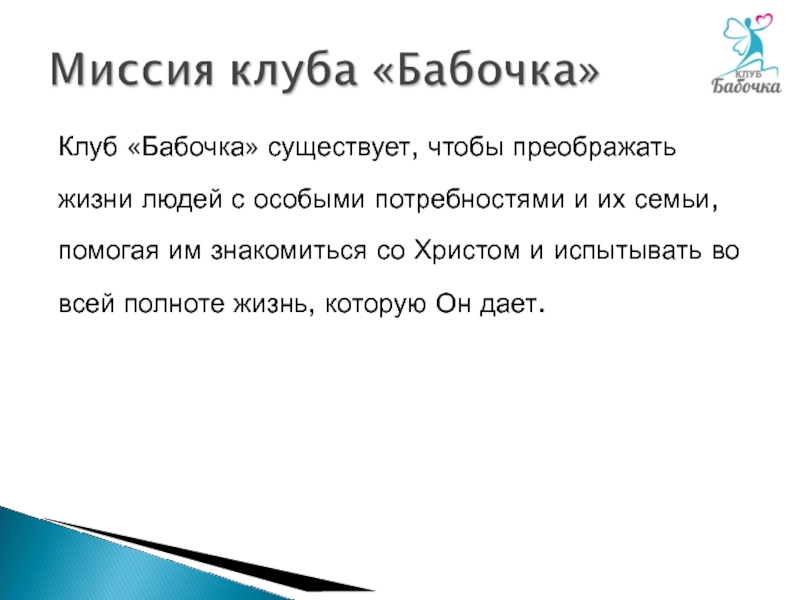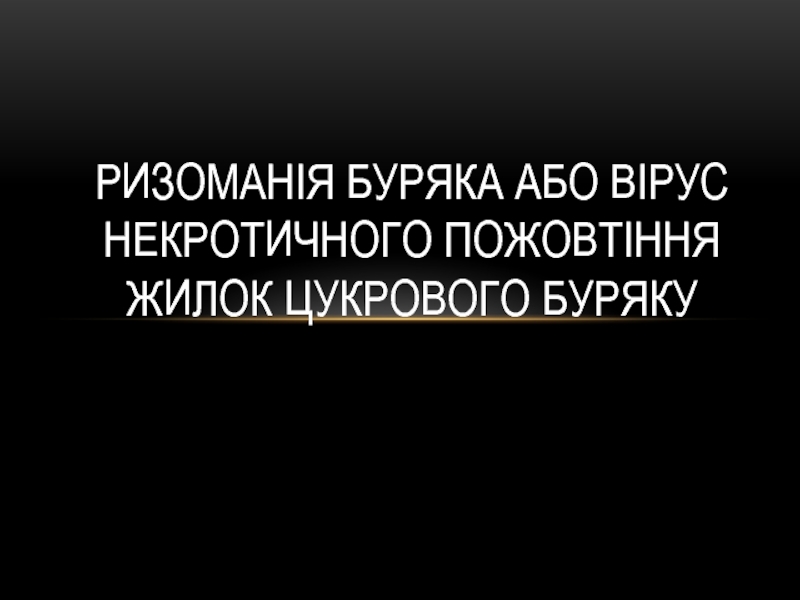Слайд 1Private International Law
Intellectual Property Law
St Petersburg State University, 28 Oct
2013
Dr. Thomas Hoffmann, LL.M., Attorney at Law (GER)
DAAD-Lecturer in
Law, University of Tartu
Part I of this presentation is partly based on a presentation by Justus Gaden, research assistant at the University of Kiel.
Слайд 2
A. Private International Law
Case: See handout
Слайд 3B. Intellectual Property Law
Part 1: What
is Intellectual Property?
Part 2: Case study
Слайд 4Intellectual Property
Patent
Trade Mark
Copyright
Слайд 5What is copyright?
Creative work
Fixed in a material form
Automatic legal
protection
Unlike Trade Marks or Patents
Absolute Right
Monopoly
Слайд 6„Author‘s Right“
Continental Europe (Germany, France)
No Formalities for Protection
`Personal Intellectual Creation`
Focus:
The Author
(„Moral Rights)“
„Copyright“(Traditional)
Anglo-Saxony/American (USA, England)
Traditionally: Formal Registration needed
Today: No Registration
`Original
Work` (No Creativity needed)
Focus: The Work
(„Economic aspects“)
Слайд 7Why should authors of creative works be protected?
Слайд 8General public interest
Cultural promotion
Encouragement of learning
Interests of the Author
Reward for
creativity
Incentive for creativity
Слайд 9
Universal Copyright Convention
Low Protection Level
101 States signed (Not signed by
Estonia)
Berne Convention
Protection of Literary and Artistic Works
166 States signed (Estonia
1994, also: China, USA, Russia)
Rome Convention
Protection of Performers and Broadcasters
89 States signed (Estonia 2000)
National Acts (Germany: `Author’s Rights Act`)
Primary Sources (Overview)
Слайд 10European Copyright?
No Community Copyright
Unlike Trade Marks
Harmonization
Minimum Standards of Berne Convention
European
Acts on the field of copyright:
Computer Programs Directive
Rental Right Directive
Satellite
and Cable Directive
Term Directive
Database Directive
Information Society Directive
Artist’s Resale Right Directive
Primary Sources (Overview)
Слайд 112. Copyright
Protected Works / Economic Rights / Violations / Free
Uses
Слайд 13
Protected Works
=
Personal Intellectual Creation
+
Fixed in some material form
(The
idea itself is not protected!)
a. Protected Works
Слайд 14Literary Works (Article 2 (1) BerneC)
Books, Articles in Newspapers, Speeches,
Lectures etc.
Creativity is necessary!
Example - Article in Newspaper:
Simple summary
of facts -> Not protected
Statement or commentary -> Protected
Length is irrelevant. But short texts need more creativity.
a. Protected Works
Слайд 15Artistic Works
Paintings, Drawings, Photos, Illustrations, Sculptures etc.
Not Protected: Simple images
or drawings without any individual insertion.
Example:
a. Protected Works
Not Protected
Protected
Слайд 16Artistic Works
Photographic works
Not only a picture of the environment
But individual
accentuation or display of the environment e.g.
Does the photographer want
to make a statement with the picture?
a. Protected Works
Слайд 17Musical Works
Songs, Melodies, Compositions, Themes
Can be fixed in various forms:
Written,
Recorded, Filmed etc.
Single tones can not be protected
Case “I’m loving
it” (District Court Munich 2010)
McDonalds jingle
Personal Intellectual Creation?
DC Munich: Not creative enough!
a. Protected Works
Слайд 18 ©
Traditional US-Law: No Copyright without ©
Today: Not necessary,
but evidence for a protected work
a. Protected Works
Слайд 20Nationality
Member States of Berne/Rome Convention
Country where the work first was
published
If the author is from a member state of the
Rome/Berne Convention
b. Protected Authors
Слайд 21WHAT IS PROTECTED BY COPYRIGHT LAW?
Слайд 22Reproduction
Copies or duplications in any form:
Paper, CD, DVD, any data
on the computer etc.
Adaption
Transformation of the work into another type
of presentation
Book Screen Play Movie
Translation
Art. 8 BerneC
c. Economic Rights
Слайд 23Distribution
The author can control where and how many copies of
his work will be sold.
Export of legal copies (Except EC
market)
Broadcasting
Public performance, wireless transmission, cabling etc.
Performing a song on stage
Uploading a music video on youtube
Showing a movie on TV
Showing a painting in a museum
c. Economic Rights
Слайд 24Economic Rights = Author’s Rights
Author can transfer economic rights
A license
is needed for every single economic right
Example:
Author writes a novel.
Transfers
the right of reproduction and broadcasting to a publishing company.
This license does not include the right of adoption.
The right to adopt this novel into a movie can be sold to a different company.
d. Licensing
Слайд 25
Adaption
Broadcast
d. Licensing
Author
Of
Written Novel
A
C
D
B
TV
Internet
Audio Book
Reproduction
Movie
Example for licensing different rights
Слайд 26Possible Restrictions of Licenses:
Territory
Example:
A TV station has the right to
show an American movie, but only in Germany.
Time
Example:
A
museum has the right to show a popular painting, but only for a month.
d. Licensing
Слайд 27Claim of Authorship
Credits at the end of a movie eg.
Object
modifications of the work
Examples:
e. Moral Rights
Special Problems:
Location as
part of
the work
(Sculptures e.g.)
Cutting scenes from
a movie. (TV)
Слайд 28
Object derogatory actions against the work
Bolero-Case (Germany): The work Bolero
of the French composer Maurice Ravel was used as background
music in a pornographic movie. The film maker had a license from the collecting society.
Violation?
No violation of economic rights.
But violation of moral rights!
Moral Rights can not be transferred!
e. Moral Rights
Слайд 29Case “Astra” (High Court Hamburg 2000)
e. Moral Rights
Astra Tower,
Hamburg
Protected?
Слайд 30Creativity: Yes!
e. Moral Rights
Astra advertising
Слайд 32Property Vs. Moral Rights
High Court Hamburg:
Designer transferred all his economic
rights.
Moral rights remain!
The designer can object modifications of his work.
Problem:
Modification or destruction?
HC Hamburg: Destruction! No moral rights violated.
OTHER RESULTS POSSIBLE
The Principle of moral rights varies in different states!
e. Moral Rights
Слайд 33Any use of licencable work Reproduction
Copy of a music CD,
downloading music
Example: Making copies in library?!
Adaption
Distribution
Broadcasting
No violation: Playing a music-CD
at home
Violation: Playing a music-CD in public for an audience
f. Violation of Economic Rights
Слайд 34Internet issues:
Peer-to-peer file sharing
Upload? Broadcasting
Download? Reproduction
Streaming
Upload? Broadcasting
Watching?
Reproduction?
f. Violation of Economic Rights
Слайд 35Who is the violator?
Example:
Unpublished novel copied by Mr. X
Mr.
X finds a publishing company
Book gets printed and published
Violators:
Mr.
X
Publishing Company
Book Store
f. Violation of Economic Rights
Слайд 36Host Provider = Violator?
Germany: “Notice and Take Down”
Examples
File Sharing Network
Napster
= Violator
Video Communities (youtube)
German Youtube denies access to many music
videos.
f. Violation of Economic Rights
Слайд 37Quotations (Art. 10 (1) BerneC)
Using parts of another persons work
in order to illustrate or prove a statement.
Parts of works
which are not individual.
Education (Art. 10 (2) BerneC)
School Books, Teaching Material
News reporting (Art. 10bis BerneC)
Public interest on current events
Example: “The Walking Man I” sold for highest price in history. The news on TV may show a picture of the sculpture.
g. Free Use
Слайд 38Case “Song Text” (German High Court 1987)
A popular German singer/songwriter
died.
City of Berlin sets up a public memory tablet
for her.
A German newspaper publishes an article about this event.
The article includes a picture of the memory tablet and the
complete text of her most popular song.
Is this legal?
g. Free Use
Слайд 39Protected work?
Song text = literary work (Art. 2 (1)
BerneC)
Violation of rights?
Reproduction (Art. 9 (1) BerneC)
Free Use?
- Quotation? Does
the song text prove a statement? -> NO!
- News Reporting? Current event: Set up of the memorial tablet. The song text was not part of that event.
No Free Use
Result: Illegal violation of copyrights!
g. Free Use
Слайд 41Other free uses in national copyright acts:
Germany
Pictures of buildings (architectural
works)
Postcards
Google Street View?
TVs and audio players in electronic stores
Reproduction for
own private use
Russia?
g. Free Use
Слайд 43Destruction and Prohibition of Use
Compensation (Civil Law)
Actual loss based on
the violation
Figurative license
Account of profits
Criminal Law
Unauthorized copies or broadcasting
Up to three years prison sentence
Industrial violation of copyrights
Up to five years prison sentence
h. Enforcement
Слайд 44
Only few provisions in the BerneC:
Art. 13 (3), 16
Seizure on imported copies
Unauthorized import
Unauthorized copies
Art. 15 (1) Presumption
of authorship
Difficult to prove authorship
Name on work = Presumption of authorship
h. Enforcement
Слайд 45
Art. 7 (1) BerneC
50 years after authors death
Longer or shorter
terms in national law
Germany: 70 years after death
Russia?
i. Term of
protection
Слайд 46j. Collecting Societies
Collec-ting
Society
Economic Rights
Money
Radio
Disco
Concert
License
License
License
Money
Money
Money
Musician
Слайд 48Persons who present creative work to the public
Own rights granted!
No
creative gratification
Unlike copyright
Just commercial gratification!
3. Related Rights
Слайд 49Rome Convention
Art. 13: Minimum Rights
Prohibit re-broadcast
Fixation of their broadcast
Not relevant
if broadcasted work is protected
Satellite and Cable Directive (EC)
a. Broadcaster’s
Right
Слайд 50Problem:
Film Producers invest enormous amounts of money
“Avatar” = 300
million Dollars (without advertisement)
Lots of different works and authors in
each movie
Story, music, screen, animations, pictures etc.
Producers need every single license (contracts)
Contracts can be invalid
High risk for film producer
Solution: Own economic right on “the film”
Acts in most European states, but no international treaty
b. Film Producer’s Right
Слайд 51No international treaty
Only some national acts
No publisher’s right in Germany
b.
Publisher’s Right
Слайд 52Copyright = Intellectual Property
Protected works
Intell. creativity + fixed in
material form
Economic and moral rights
Monopoly
License every or single economic
rights
Moral rights can not be transferred
Related Rights
Commercial benefit
4. Summary
Слайд 53Part II: Case study
Part I:
Claim W R
acc. to sec. 97 I, 23, 13, 14 UrhG
for cease and desist of the CD
Слайд 54Section II: Case Part I
Claim W R acc. to
sec. 97 I, 23, 13, 14 UrhG
for
cease and desist of the CD
Protected work, sec. 2 UrhG?
Does not necessarily have to be music, sec. 2 I nr. 2; it just has to be an individual intellectual act of creativity, sec. 2 II
2. Standing to sue
W is author of the composition and therefore may sue himself, sec. 7.
Слайд 55Section II: Case Part I
3. Infringement of Copyright:
a) Adapation
A protected work may only be
adaptated with consent of the author, sec. 23, 1 UrhG.
Here: R did take only the melody of „Romanze“
Are parts of works protected as well acc. to 2 II?
Yes, if „unusual“ and „discernible“
Here: For the Melody adaptation (+)
Слайд 56Section II: Case Part I
3. Infringement of Copyright:
a)
Adapation
But: Maybe case of Free Use, sec.
24 I?
The original character must have stepped back in favour of new creation
Here: R replaced W’s contemplative approach with hot Samba rhythms
Слайд 57Section II: Case Part I
3. Infringement of Copyright
a)
Adapation
But: Maybe case of „Free
Use“, sec. 24 I?
The original character must have stepped back in favour of new creation
Here: R replaced W’s contemplative approach with hot Samba rhythms
But: Melodies are protected if discernibly taken from
existing compositions. Here: (+)
Слайд 58Section II: Case Part I
3. Infringement of Copyright:
a) Adapation
There will be only an infringement
if the adaptation has been published or exploited (sec. 23 I).
Here: (+), see
sec. 15 III (publication),
se.c 16 I, 17 I (exploitation).
There is a copyright infringement, sec. 23 I.
Слайд 59Section II: Case Part I
3. Infringement of Copyright:
b) Missing recognition of the author
Acc to
sec. 13, W is entitled to be identified as the author of the work.
Here: W is not mentioned on R’s CD;
Copyright infringement, sec. 13
Слайд 60Section II: Case Part I
3. Infringement of Copyright:
b) Distortion of the work, sec. 14
The
integrity of the author’s is violated if
- the work is distorted,
- the author’s interest are effected and
- the balance of interest results in favour of the author’s interest in the integrity of his work.
Слайд 61Section II: Case Part I
3. Infringement of Copyright:
b) Distortion of the work, sec. 14
The
integrity of the author’s is violated if
- the work is distorted,
- the author’s interest are effected and
- the authors’ integrity interests prevail.
Here:
Result is controversial: Extensive market success (charts); obviously, R provided a „quality distortion“.
No infringement of sec. 14
Слайд 62Section II: Case Part I
4. Risk of repeated infringement, sec.
97 I 1
The risk of repeated infringement is assumed in
cases of an already existing infringement.
Слайд 63Section II: Case Part I
4. Risk of repeated infringement, sec.
97 I 1
The risk of repeated infringement is assumed in
cases of an already existing infringement.
5. Interim Result:
W is entiteld to claim from R to cease and desist of the CD acc. to sec. 97 I, 23, 13, 14 UrhG.
Damages (e.g. 97 II) have not been claimed.
Слайд 64Section II: Case Part I
II. Claims W P for
„related rights infringement“
acc. to sec. 97
I, 16, 19a, 77 II, 78 I Nr. 2 UrhG
Protected rights
Not only the author’s rights, but also related rights of the performing artist and the producer may be violated.
Слайд 65Section II: Case Part I
II. Claims W P acc.
to sec. 97 I, 16, 19a, 77 II, 78 I
Nr. 2 UrhG
Protected rights
Here: W did not only compose the melody, he also performed it himself.
He is performing artist acc. to sec. 73 UrhG.
(He is not Producer, sec. 85 I UrhG; this is the Bavarian Broadcasting Cooperation).
Слайд 66Section II: Case Part I
II. Claims W P acc.
to sec. 97 I, 16, 19a, 77 II, 78 I
Nr. 2 UrhG
2. Infringement of protected rights
There could be an infringement in form of
- copies, sec. 16 I UrhG, and by
- making available to the public, sec. 19a UrhG.
Слайд 67Section II: Case Part I
II. Claims W P acc.
to sec. 97 I, 16, 19a, 77 II, 78 I
Nr. 2 UrhG
2. Infringement of protected rights
Here:
sec. 16 I UrhG:
P saved „Romanze“ on his PC. copy (+)
making available to the public, sec. 19a UrhG:
Providing for download infringement (+)
Слайд 68Section II: Case Part I
II. Claims W P acc.
to sec. 97 I, 16, 19a, 77 II, 78 I
Nr. 2 UrhG
3. Eventual justification?
- sec. 44a, Temporary acts of reproduction?
No, saved on harddrive; not temporarily
(as on buffer)
- sec. 53, Private Use? No
- sec. 17 II, Distribution? No consent by W
- sec. 52, 52a, Non-profit Communication?
No, done for commercial purpose
Слайд 69Section II: Case Part I
II. Claims W P acc.
to sec. 97 I, 16, 19a, 77 II, 78 I
Nr. 2 UrhG
4. Legal consequences:
claim for cease and desist acc. to sec. 97 I 1
Damages, sec. 97 II: Even if he did know positevely that he was not entitled to donwload,
he did not act in due diligence, sec. 276 II
Amount: Calculation by licence analogy, 97 II 3,
i.e. € 500
Слайд 70Section II: Case Part I
II. Claims W T acc.
to sec. 97 I, 16, 77 II UrhG
Infringement of protected
rights:
Yes, as above
2. Justification
Protection of W restricted by sec. 53 I UrhG?
Слайд 71Section II: Case Part I
II. Claims W T acc.
to sec. 97 I, 16, 77 II UrhG
1. Infringement of
protected rights:
Yes, as above
2. Justification
Protection of W restricted by sec. 53 I UrhG?
No commercial purpose of T
But counterexception „obviously unlawfully- produced model“? yes
Слайд 72Section II: Case Part I
II. Claims W T acc.
to sec. 97 I, 16, 77 II UrhG
2. Justification
But
counterexception
„unlawfully-produced model“? yes
But „obvious“?
Here: (+) „Technical Copy protection“ printed on cover (sec. 95 a UrhG)
(-) Made available by professional dealer
Final result: Obvious unlawfully produced (+)
Слайд 73Section II: Case Part I
II. Claims W T acc.
to sec. 97 I, 16, 77 II UrhG
3. Legal consequences:
A
claim for cease and desist requires a risk of repeated infringement, sec. 97 I.
Here: Obviously T will not download it a second time, but German jurisdiction keeps strict line:
An effected infringement assumes risk of repetition.
Слайд 74Section II: Case Part I
II. Claims W T acc.
to sec. 97 I, 16, 77 II UrhG
3. Legal consequences:
Claim for cease and desist, sec. 97 I.
Besides: Claim for damages, sec. 97 II UrhG
And:
Duty to destroy illegal copy, sec. 98 I UrhG.
Слайд 75Section II: Case Part II
Trademark Law
Claims S P for
cease and desist of using the domain www.steinhuber.de
Sec. 14
V, II MarkenG
1. Standing to sue:
„Steinhuber“ is a registered trademark, sec. 4 Nr 1 MarkenG.
S may sue.
Слайд 76Section II: Case Part II
Claims S P for cease
and desist of using the domain www.steinhuber.de
Sec. 14 V, II
MarkenG
2. Infringement of a trademark:
General conditions for infringement, sec. 14 II:
P uses the domain as address in commercial use, sec.
14 III Nr. 2 MarkenG.
He also uses steinhuber as a trademark, i.e. in order
to distinguish his product by a name on the market.
Finally, S did not declare his consent.
Слайд 77Section II: Case Part II
Sec. 14 V, II MarkenG
2. Infringement
of a trademark:
b) Collision acc. to sec 14 II MarkenG:
„Double
identity“, sec. 14 II Nr. 1:
„using a sign which is identical to the ev. violated trade mark“ Here: No, there is www.(...).de
Слайд 78Section II: Case Part II
Sec. 14 V, II MarkenG
2. Infringement
of a trademark:
b) Collision acc. to sec 14 II MarkenG:
„Double
identity“, sec. 14 II Nr. 1:
„using a sign which is identical to the ev. violated trade mark“ Here: No, there is www.(...).de
„Likelihood of confusion“, sec. 14 II Nr. 2:
The offered goods (pianos) are partly identical, (+)
Слайд 79Section II: Case Part II
Sec. 14 V, II MarkenG
2. Infringement
of a trademark:
b) Collision acc. to sec 14 II MarkenG:
„Double
identity“, sec. 14 II Nr. 1:
„using a sign which is identical to the ev. violated trade mark“ Here: No, there is www.(...).de
„Likelihood of confusion“, sec. 14 II Nr. 2:
The offered goods (pianos) are partly identical, (+)
Extended protection for standing reputation, 14 II Nr. 3: „Steinhuber“ enjoys reputation, but no data about intensity, (-)
Слайд 80Section II: Case Part II
Sec. 14 V, II MarkenG
3. Justification:
By
authorisation of P?
aa) Exhaustion, sec. 24 MarkenG?
„put on the
market by P under trade mark designation by S“
Here: P sells S’ pianos, but not exclusively
Слайд 81Section II: Case Part II
Sec. 14 V, II MarkenG
3. Justification:
By
authorisation of P?
aa) Exhaustion, sec. 24 MarkenG?
P sells S’
pianos, but not exclusively
Besides: No sec. 24 I if the practice „opposes the use of the trade mark in connection with further commercialisation“?
Here: S cannot use www.steinhuber.de any more
Слайд 82Section II: Case Part II
Sec. 14 V, II MarkenG
3. Justification:
By
authorisation of P?
bb) use of TM as
indication of characteristics, 23 Nr. 2?
Use of a trademark itself does not „describe“ characterists, but name the producer
Besides: Same balance of interests as under aa)
Here: (-)
Слайд 83Section II: Case Part II
Sec. 14 V, II MarkenG
3. Justification:
b)
By authorisation of Sven Steinhuber?
Acc. to sec. 23 Nr.
1 MarkenG, the use of the proper name is generally permitted, even if it is identical with a registered Trademark.
Слайд 84Section II: Case Part II
Sec. 14 V, II MarkenG
3. Justification:
b)
By authorisation of Sven Steinhuber?
Acc. to sec. 23 Nr.
1 MarkenG, the use of the proper name is generally permitted, even if it is identical with a registered Trademark.
Anyhow, sec. 23 Nr. 1 has to be interpreted according to the principles of good faith; Sven is only a kind of „dummy“. P has littel interest in the person of Sven himself. Sec. 23 Nr. 1 (-)
Слайд 85Section II: Case Part II
Sec. 14 V, II MarkenG
4. Legal
consequences:
Claim for cease and desist:
As P already runs the
domain successfully, the danger of recurrence acc. To sec. 14 V 1 MarkenG exists.
Слайд 86Section II: Case Part II
Sec. 14 V, II MarkenG
4. Legal
consequences:
b) Transfer of domain:
NO!
S would have a better
position than before;
eventually third parties have effective rights in the domain: A domain is no absolute right which is attributed exclusively to one person
Слайд 87Section II: Case Part II
Sec. 15 IV, II MarkenG
„Steinhuber“ is not only a registered trademark, but also
a registered commercial designation referring to Steinhuber as a company.
The designation has been used by P; there is an infringement.
The legal consequences are the same as in sec. 14 II.
Слайд 88Section II: Case Part II
III. Sec. 12 BGB
The
Bürgerliches Gesetzbuch (BGB) provides protection
of
unauthorized use of names as well.
Anyhow, 15 MarkenG is lex specialis to sec. 12;
No claim
Слайд 89Section II: Case Part II
IV. Claims due to unfair competition
S could be entitled to claims based on UWG
(Unfair
Competetion Act), especially on
cessation and desistance, sec. 8 I,3 I UWG and due to
misleading commercial practices, sec. 5 II UWG.
Слайд 90Section II: Case Part II
IV. Claims due to unfair competition
Standing to sue:
S is a competitor of P and may
therefore sue himself, sec. 8 III Nr. 1 UWG.
2. Use in commercial practice, sec. 2 I Nr. 1 UWG:
S uses www.steinhuber.de for advertisement, (+)
Слайд 91Section II: Case Part II
IV. Claims due to unfair competition
3.
Unfairness
a) Misleading consumer by using the domain
www.steinhuber.de, sec. 5 II UWG?
Слайд 92Section II: Case Part II
IV. Claims due to unfair competition
3.
Unfairness
Trademark Law has no general priority over Unfair
competetion Law in the field of consumer law!
Also the scope of examination is different: The impact of
the average consumer’s perception is decisive.
Anyhow, here, also from a consumer’s perspective the
use may be misleading; he may expect that the domain
refers to Steinhuber directly. Risk of misguidance (+)
Слайд 93Section II: Case Part II
IV. Claims due to unfair competition
3.
Unfairness
b) Deliberate Obstruction of Competitors, sec. 4 nr. 10?
Generally, there mere use of a domain is an issue of
Trademark law.
In cases of deliberately harming acts, UWG may be
applied: Here, P does not (only) intend to lock out S
from the domain, but intends to use it for advertisment
reasons No deliberate obstruction
Слайд 94Section II: Case Part II
IV. Claims due to unfair competition
4.
Tangibility, sec. 3 I, II UWG
There must be an tangible
impairment of the consumers
ability to decide autonomously. Here: (+)
Слайд 95Section II: Case Part II
IV. Claims due to unfair competition
4.
Tangibility, sec. 3 I, II UWG
There must be an tangible
impairment of the consumers
ability to decide autonomously. Here: (+)
5. Legal Consequence, sec. 8 I UWG:
Cease and desist (+)
Слайд 96Section II: Case Part III
Patent Law
Claim P S acc.
to sec. 139 I, 9 s. 2 Nr. 1 PatG
1.
Existing Patent?
Yes, the patent has been successfully granted acc. to sec. 49, 58 PatG.
Even if the grant was effected unlawfully, the patent is still effective
Слайд 97Section II: Case Part III
2. Standing to sue Yes,
P holds the patent
3. Patent infringement:
P
uses the same mechanism, sec 9 S. 2 Nr. 1 PatG
4. Justification by previous use?
S is not barred to use the mechanism if he
verifiably used it before P applied for the patent.
Here: (+)
Слайд 98Section II: Case Part III
II. Procedural means against P’s patent
Objection
There is a three-months-deadline for objection after
granting a patent, sec. 59 I PatG, which here expired
already.
2. Action for nullification
Admissibility:
Conditions are ample, sec. 81 PatG: S will claim that the
conditions of sec. 3 PatG (lack of novelty) were not
given.
Слайд 99Section II: Case Part III
II. Procedural means against P’s patent
2.
Action for nullification
b) Substantial legal grounds
Nullity according to
sec. 22 I 1. Alt, 21 I 1 Nr. 1 PatG?
Eventually missing novelty, sec. 3 I PatG?
Here: P told his friend about the invention secretly; the
invention was not made explicitly available to public.
But: The mechanism was in use and was generally
easily discernible by trained professionals.
The invention lacked novelty.
Слайд 100Section II: Case Part III
II. Procedural means against P’s patent
3.
Interim result
S may successfully file an action for nullification against
P’s patent.
III. Result
P is not entitled to any claims against S. On the contrary, he may face nullification of his patent on request by S.
Слайд 101IV. Contact
Dr. Thomas Hoffmann, LL.M.,
Attorney at Law (Ger)
DAAD-Lecturer in
Law
Tartu University
Näituse 13a
50409 Tartu, Estonia
Tel +372 5919 6614
Home www.rechtintartu.ee
